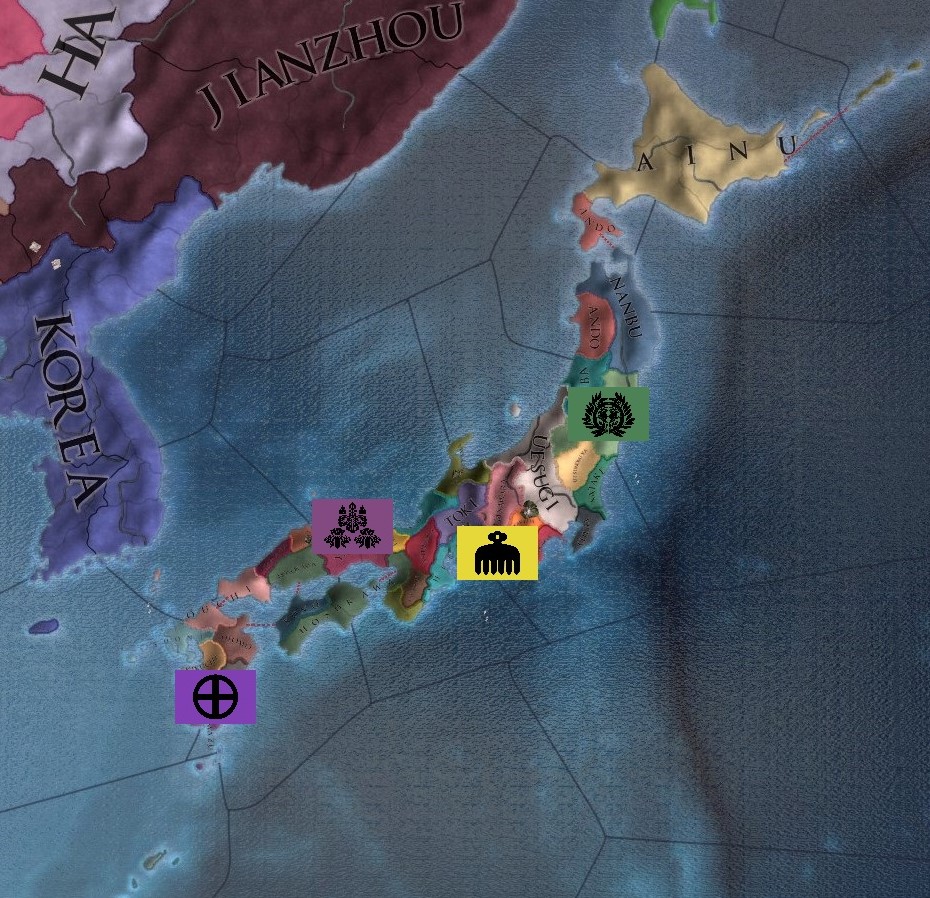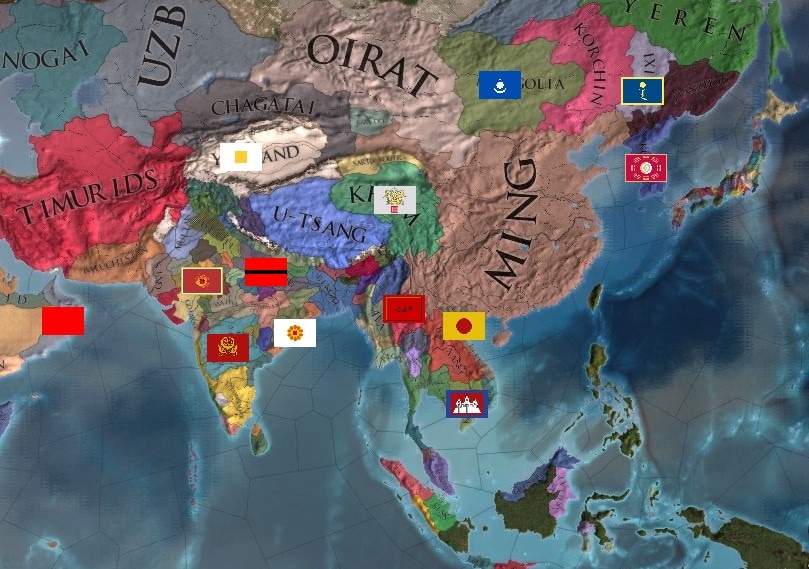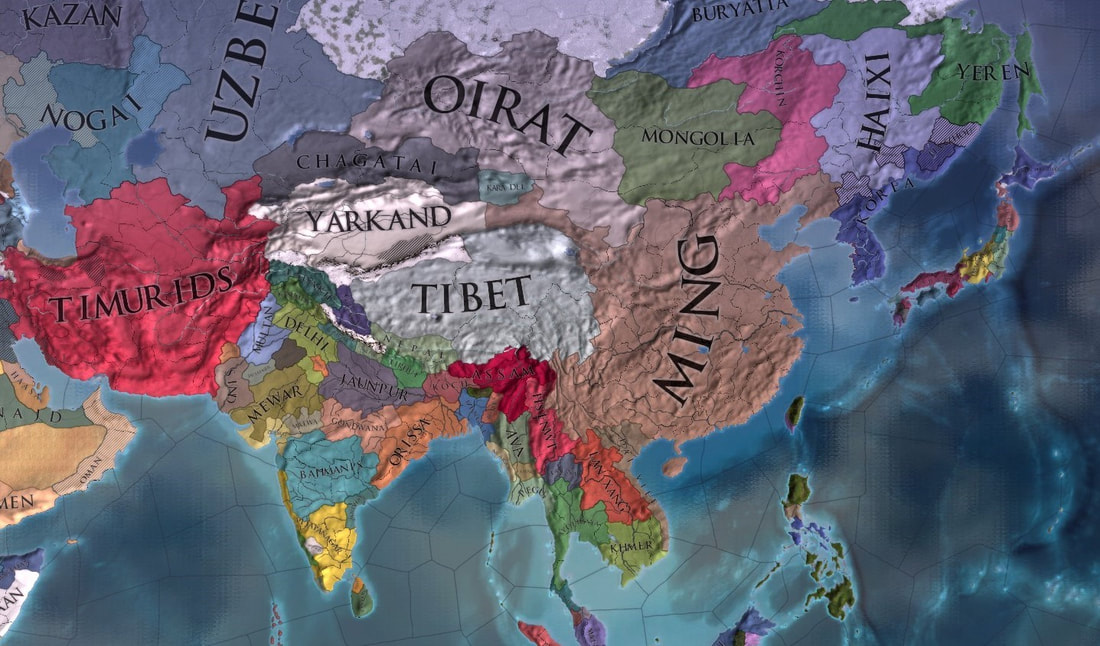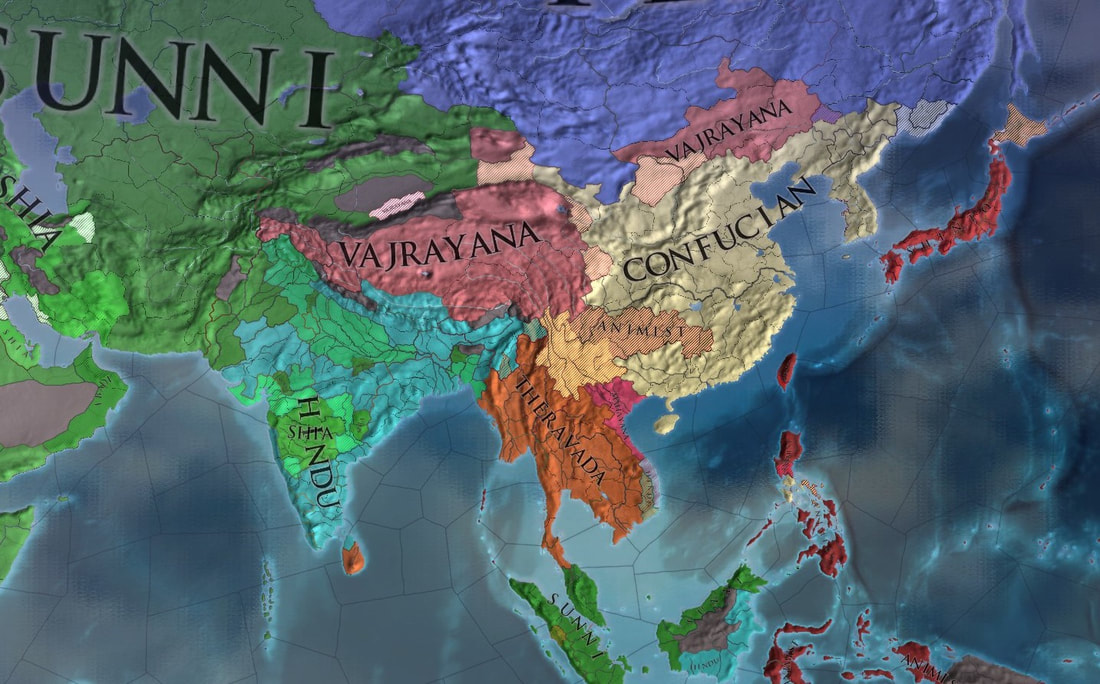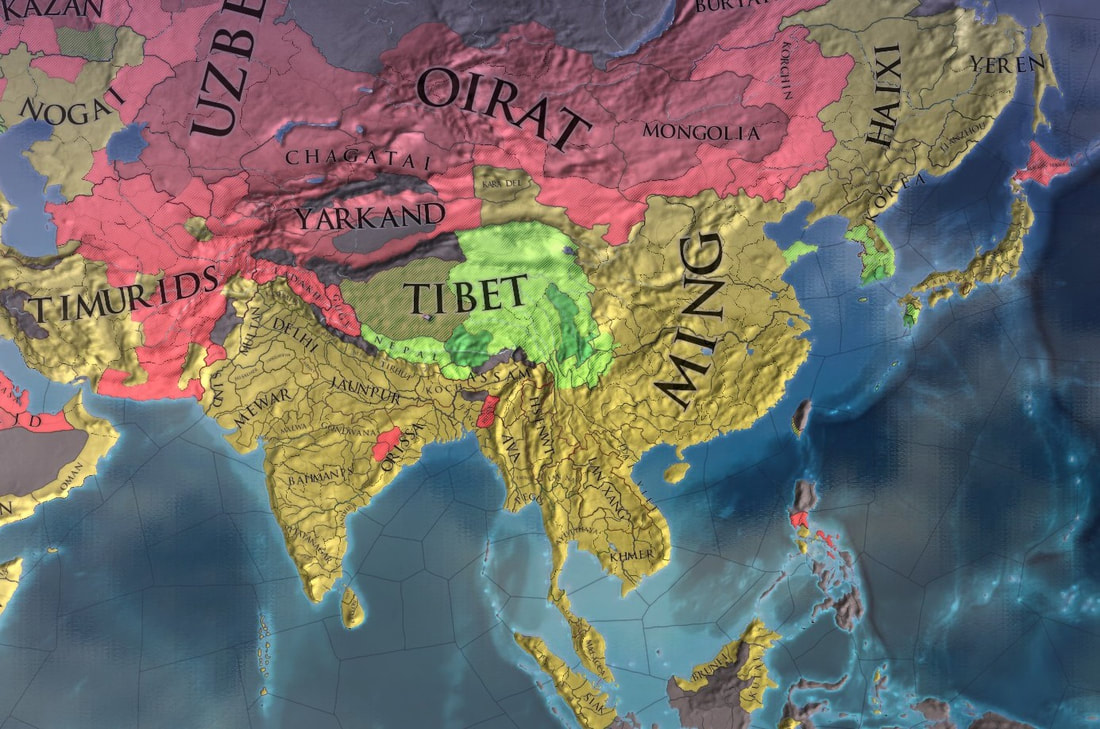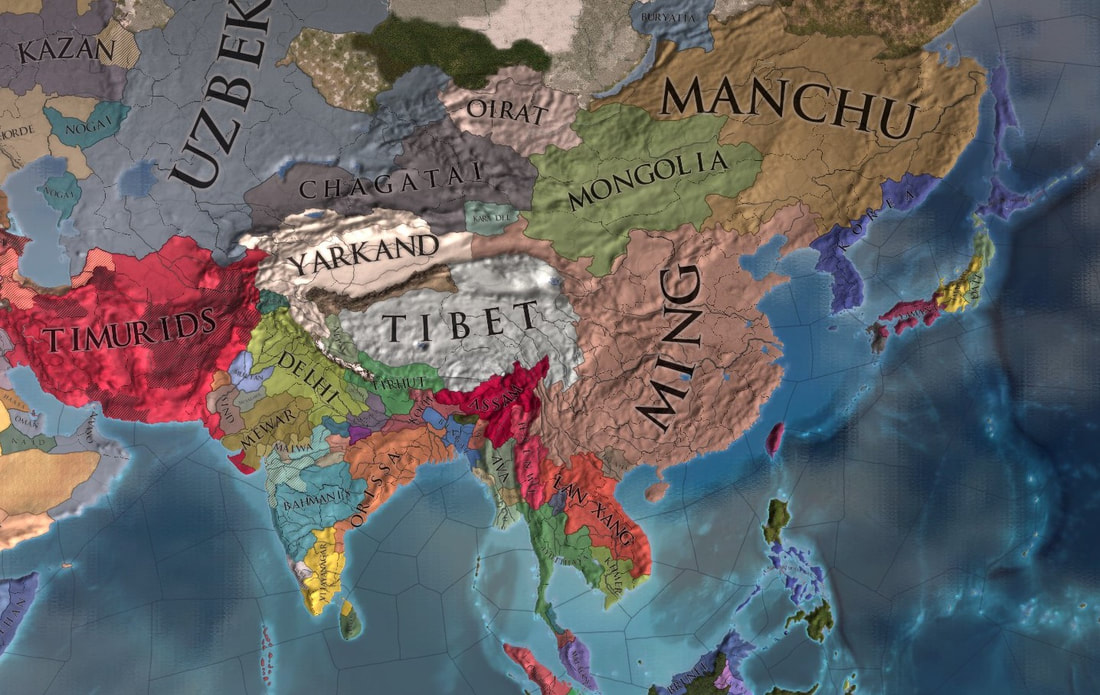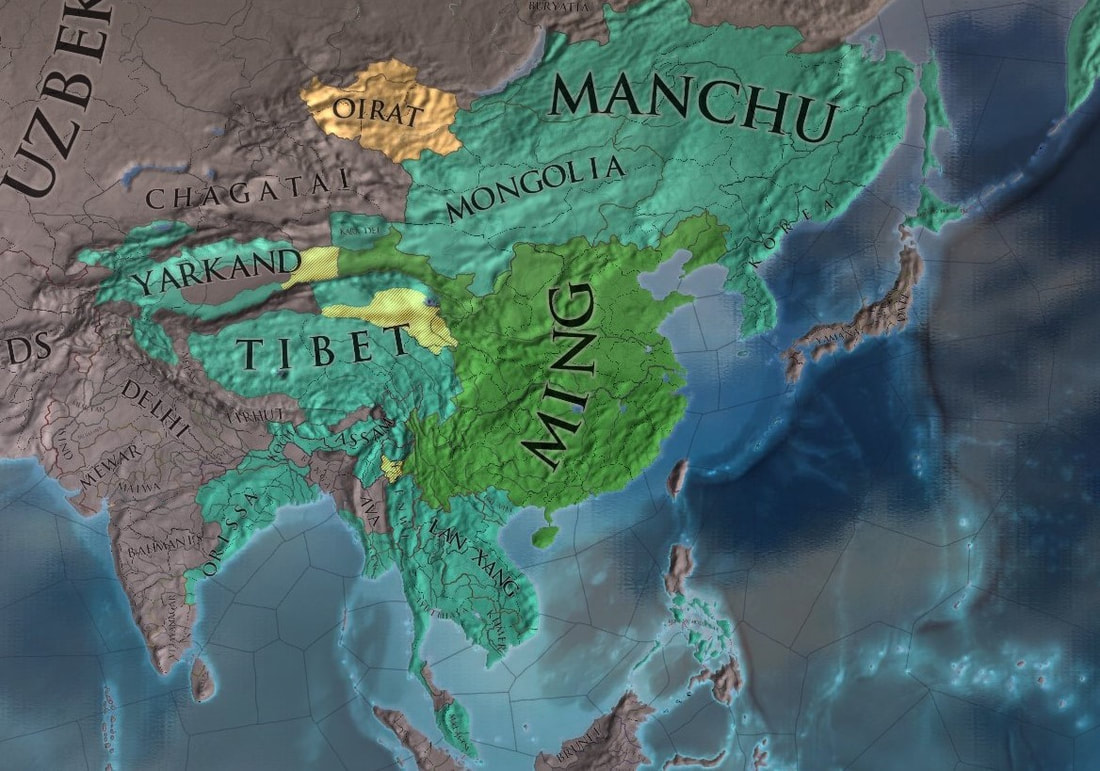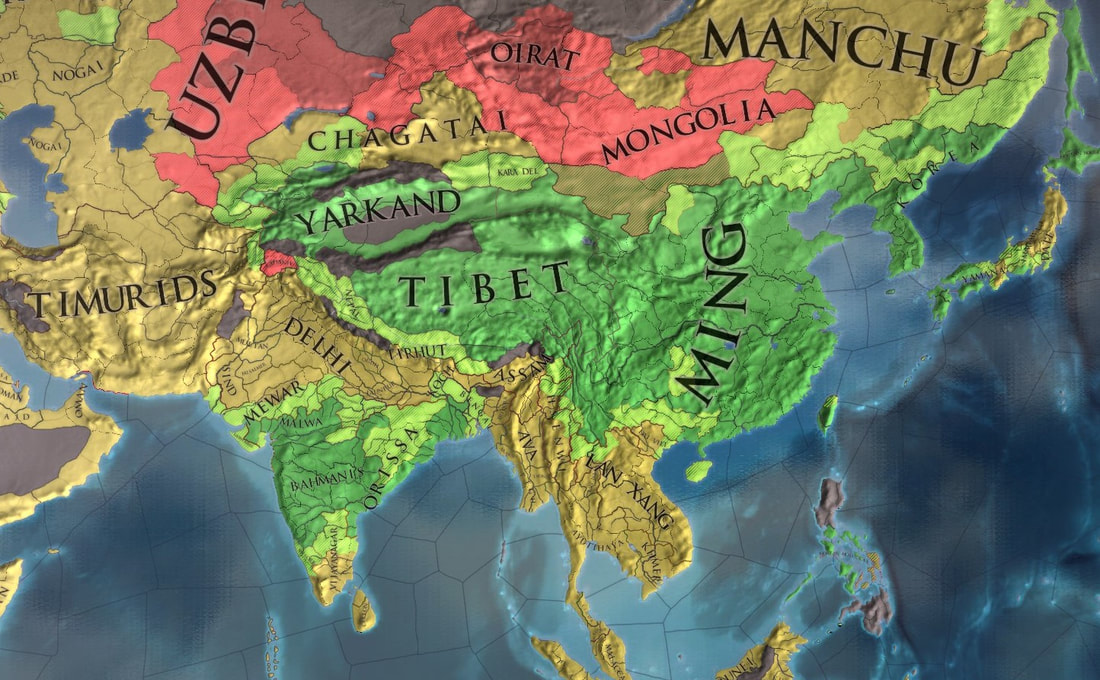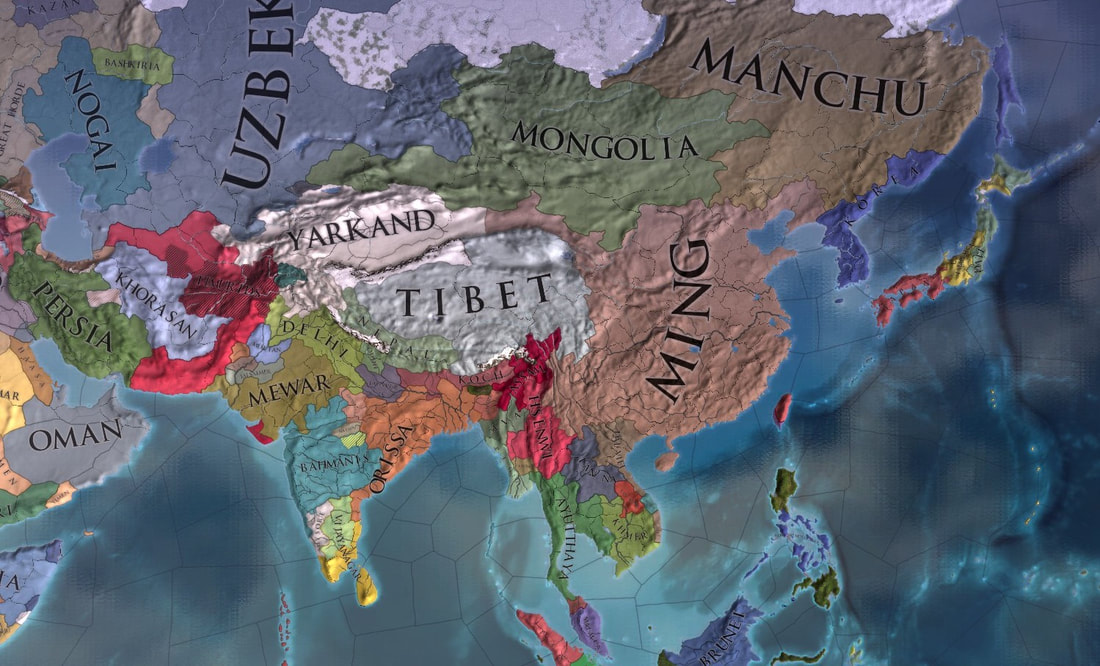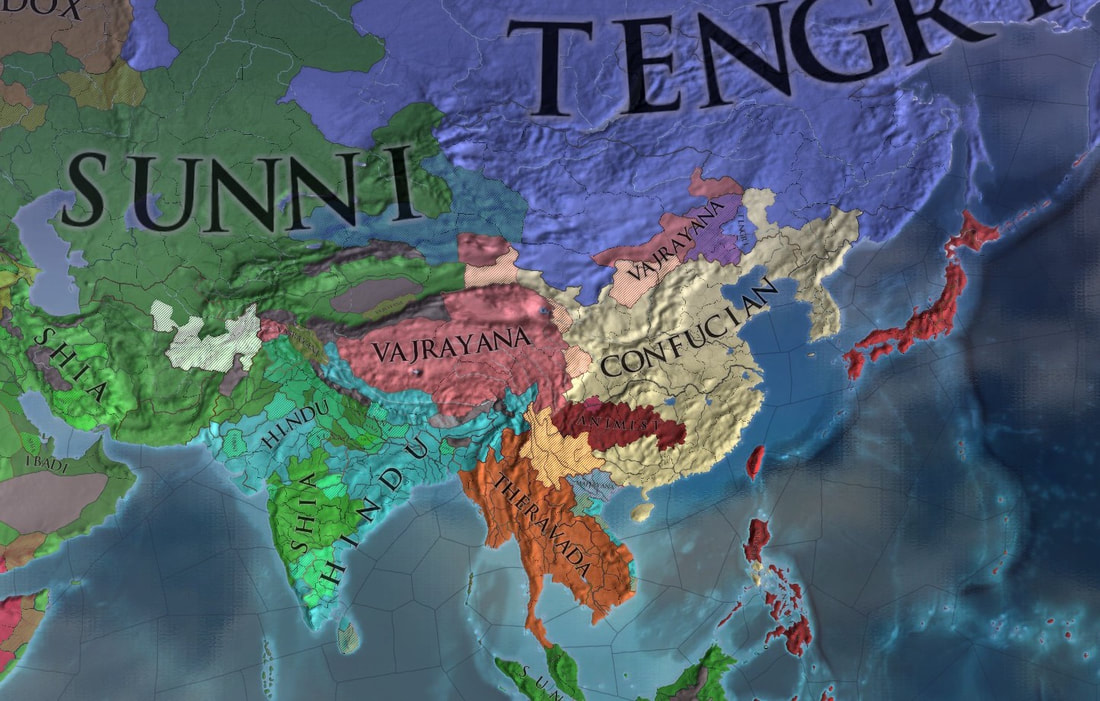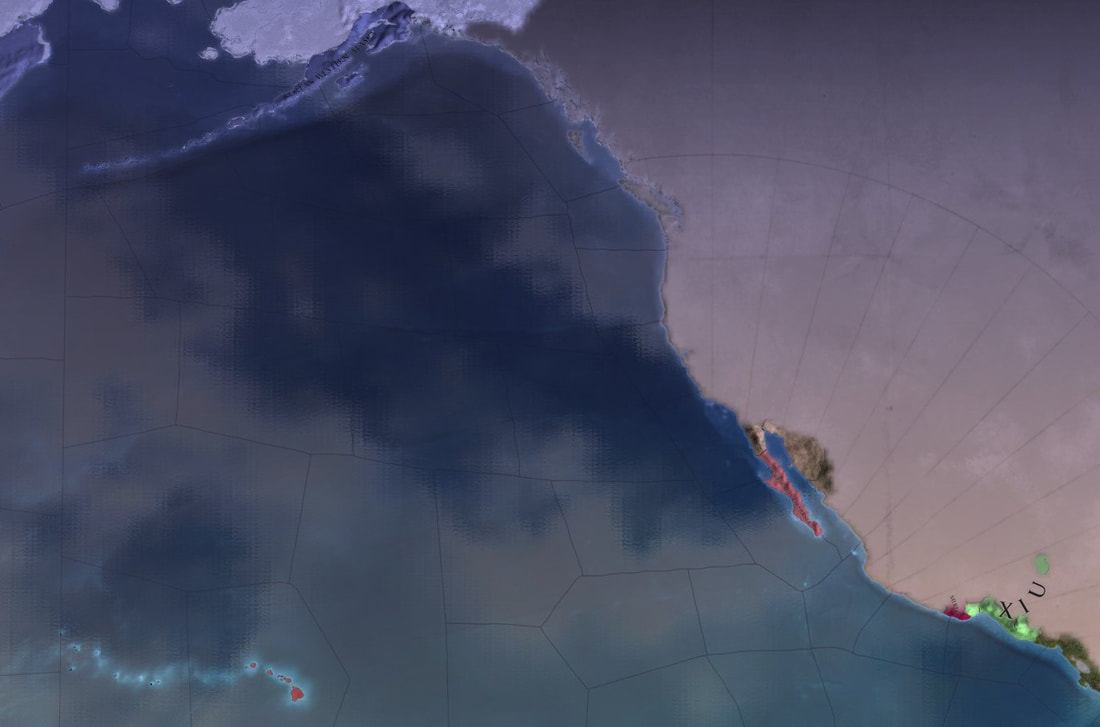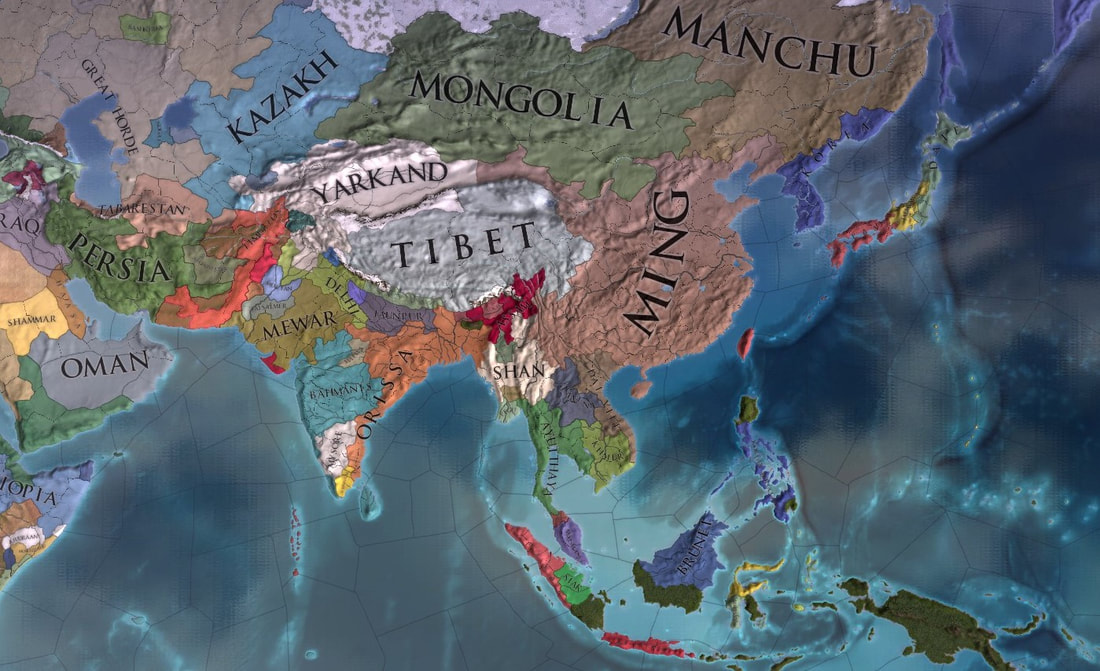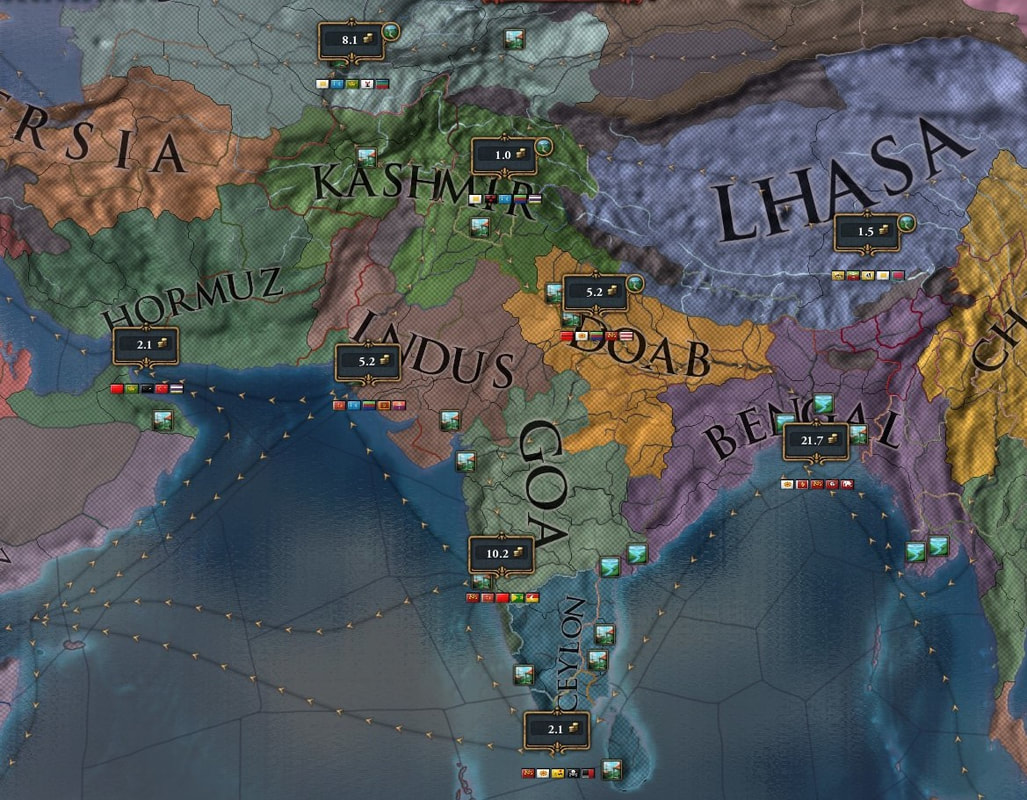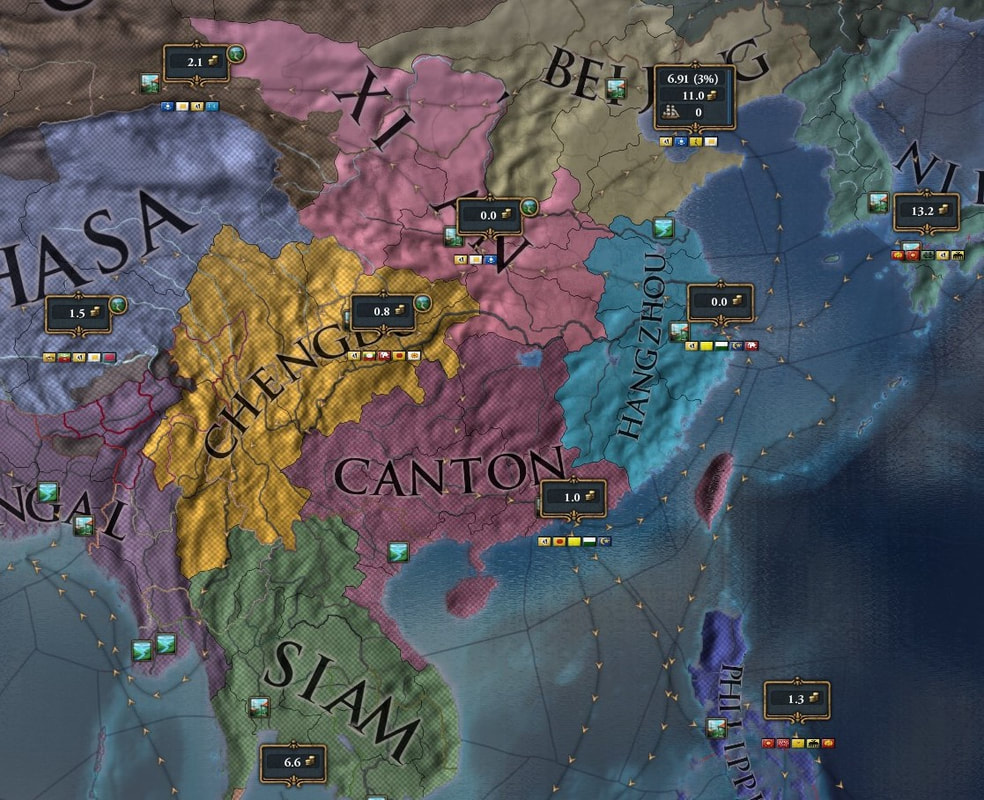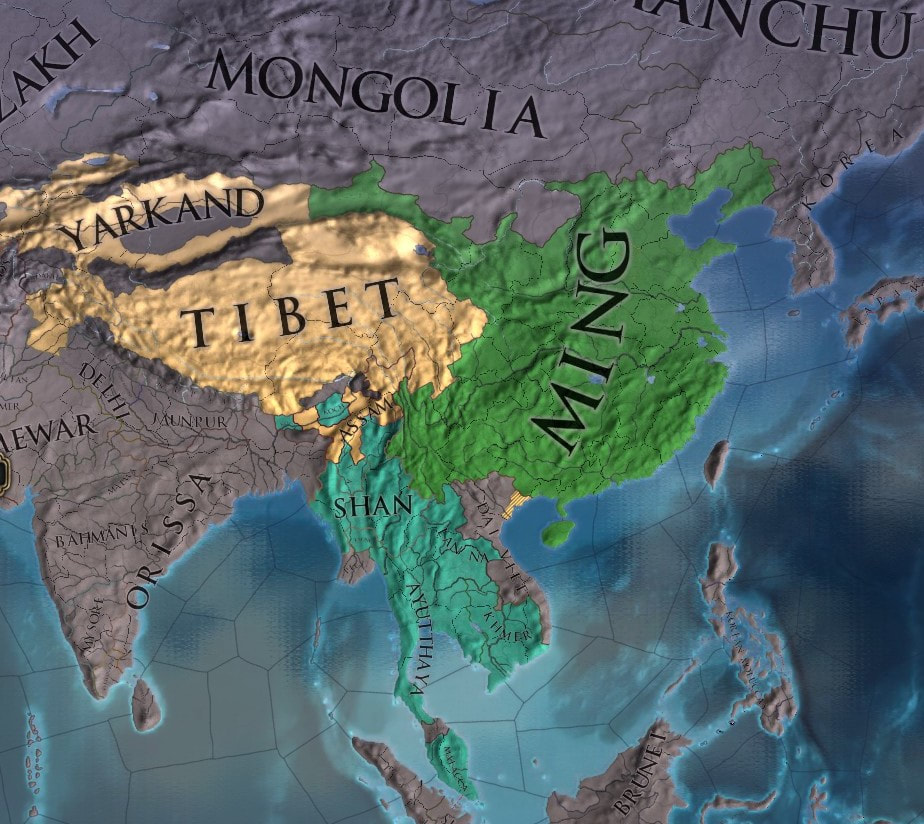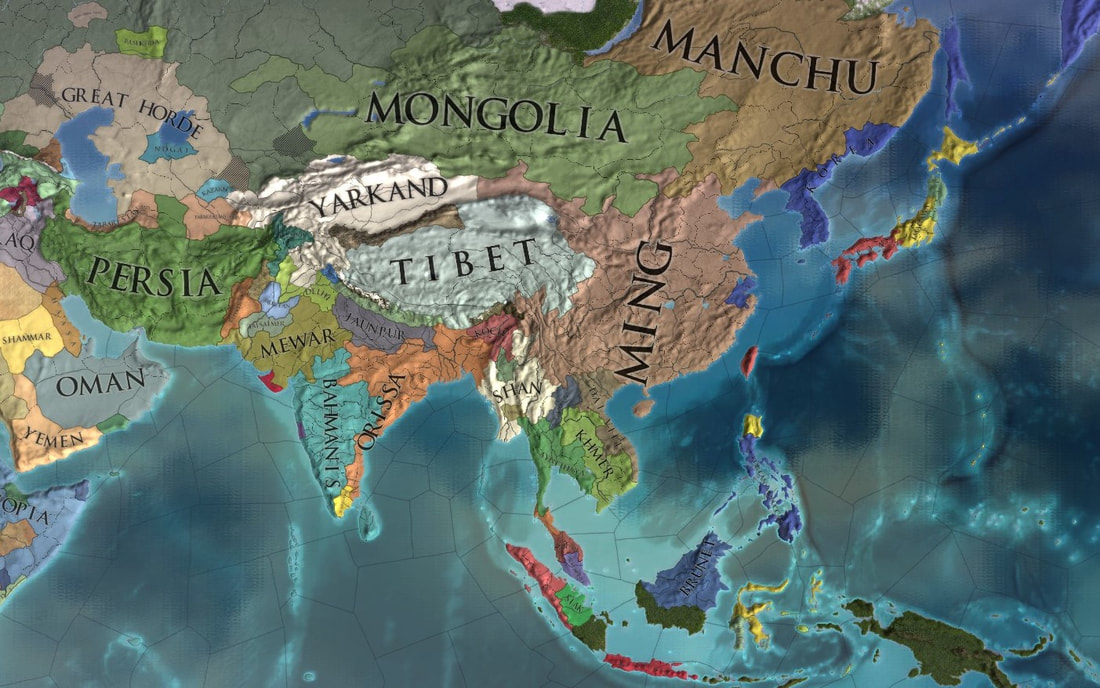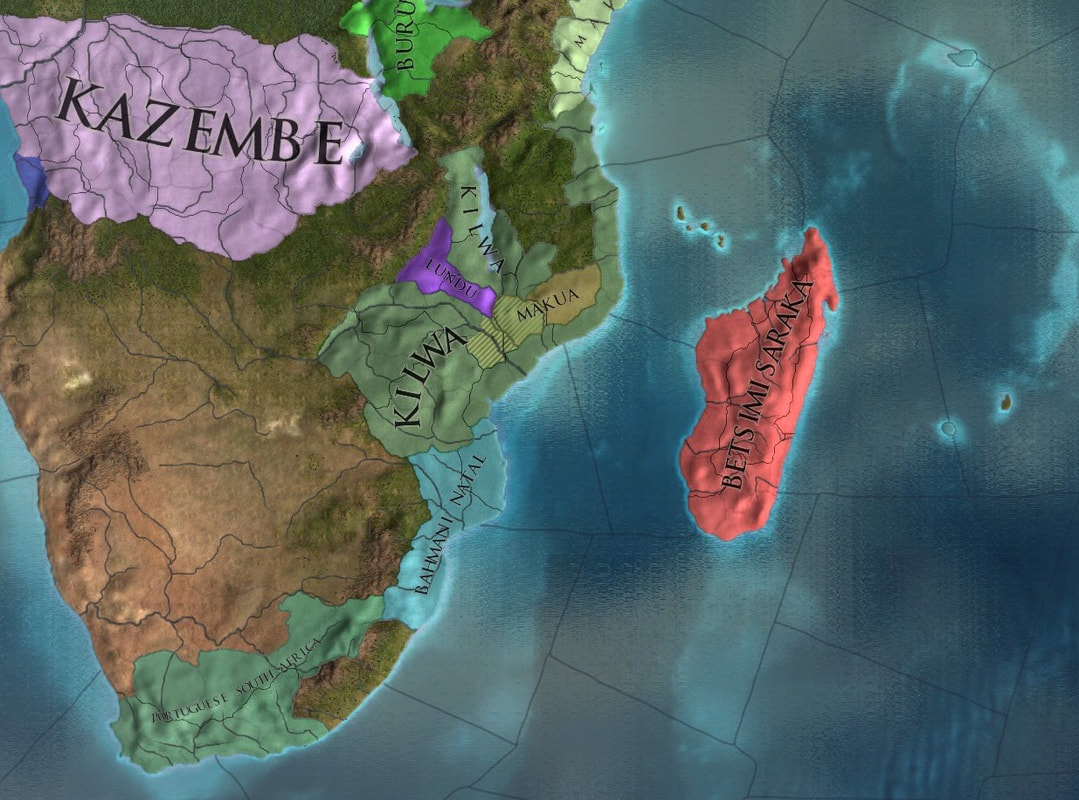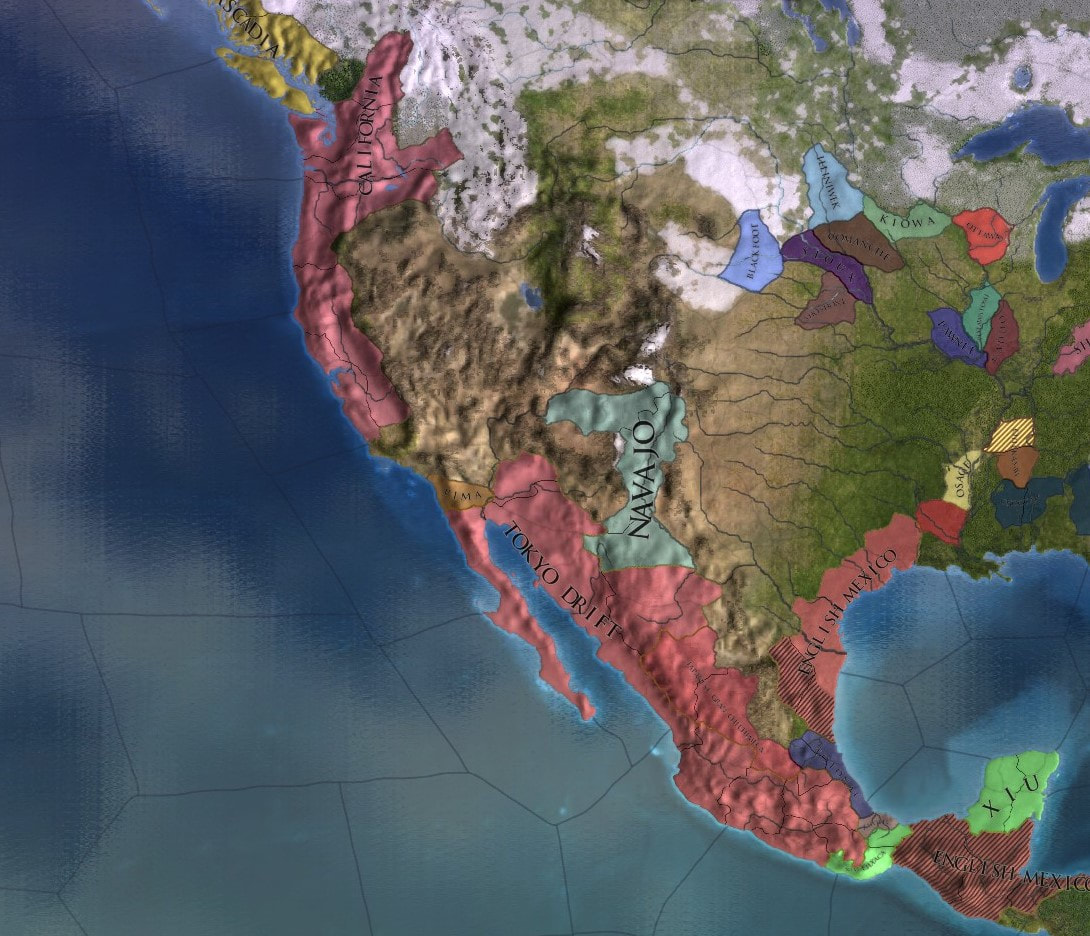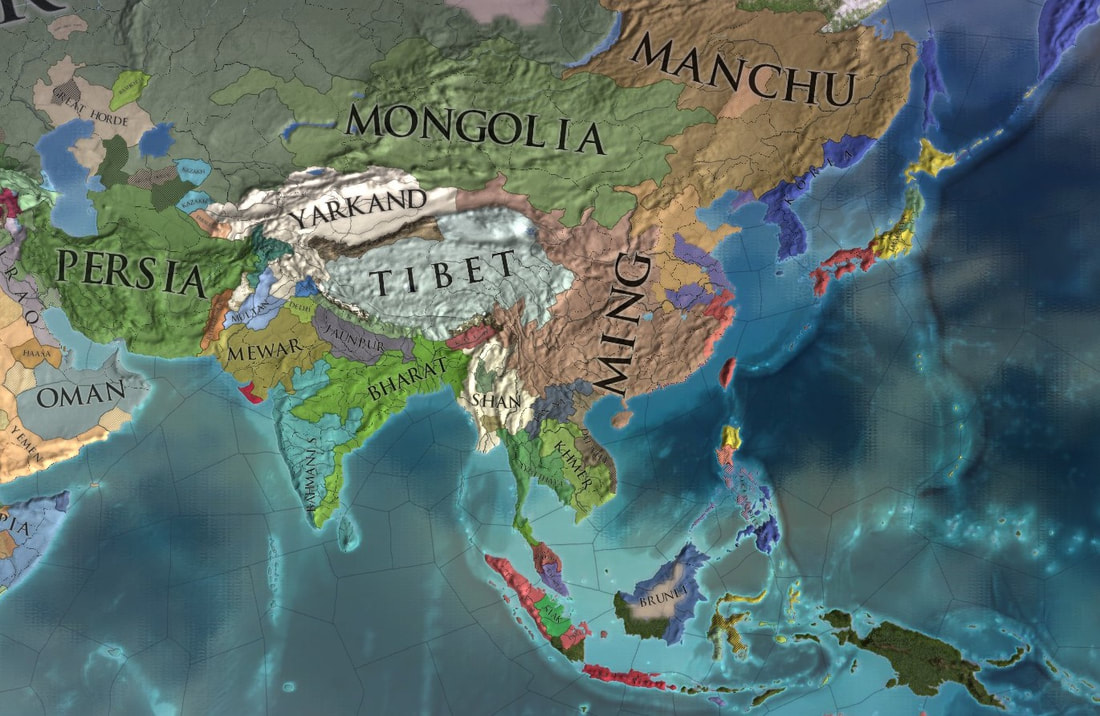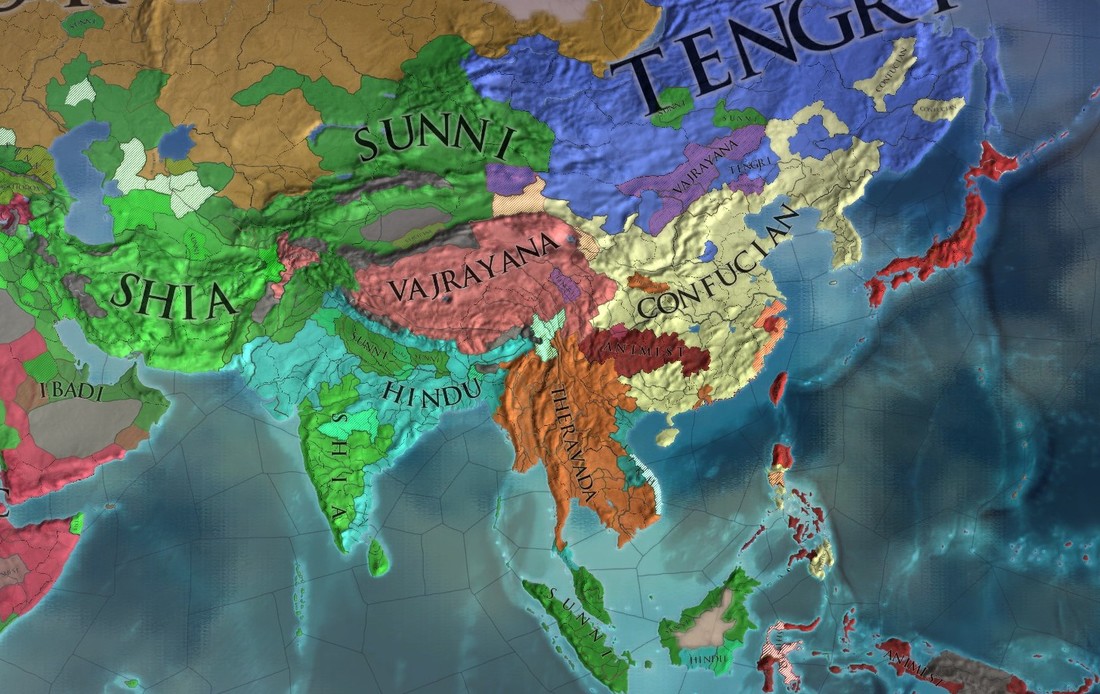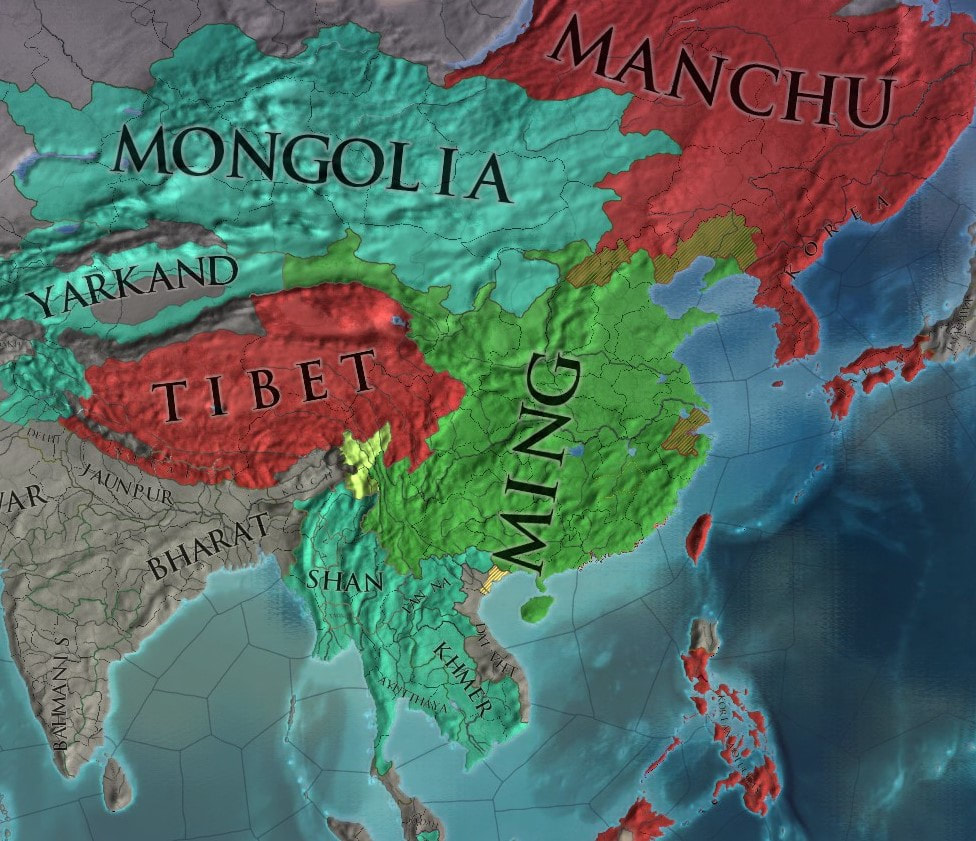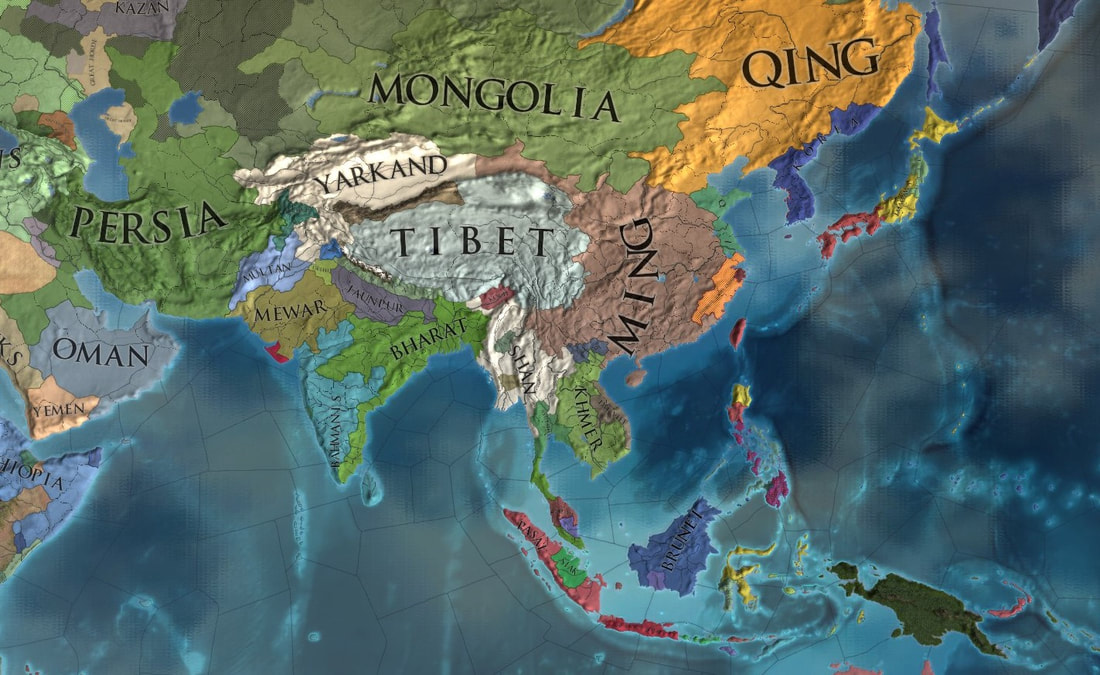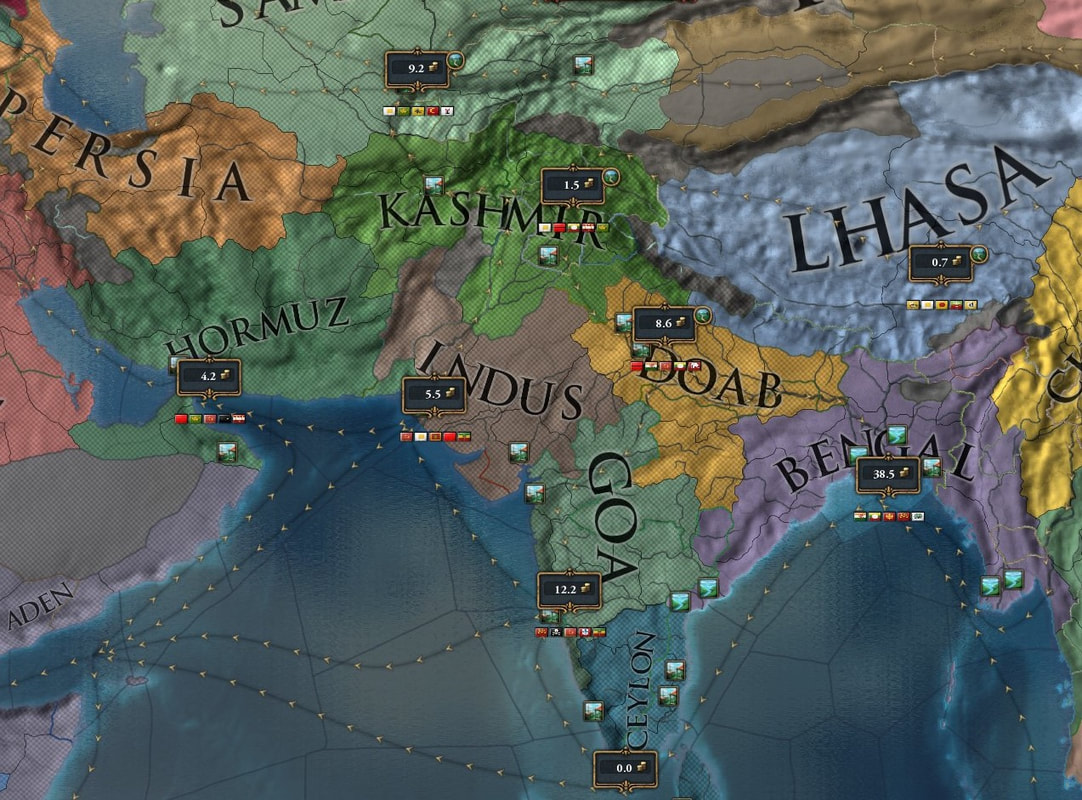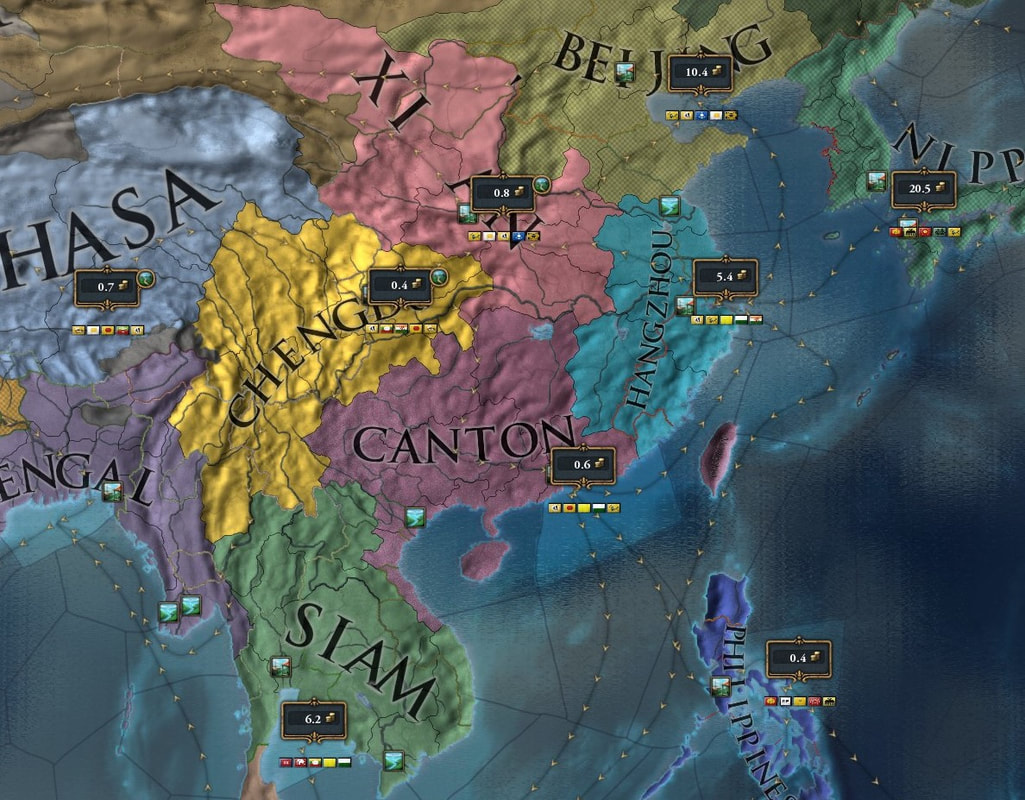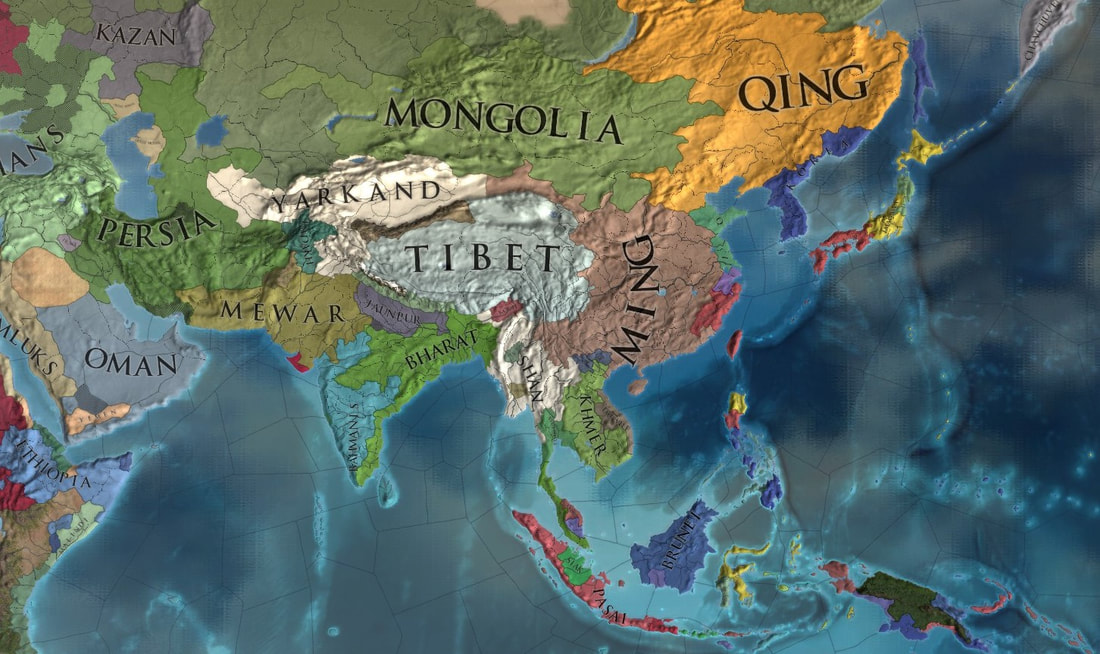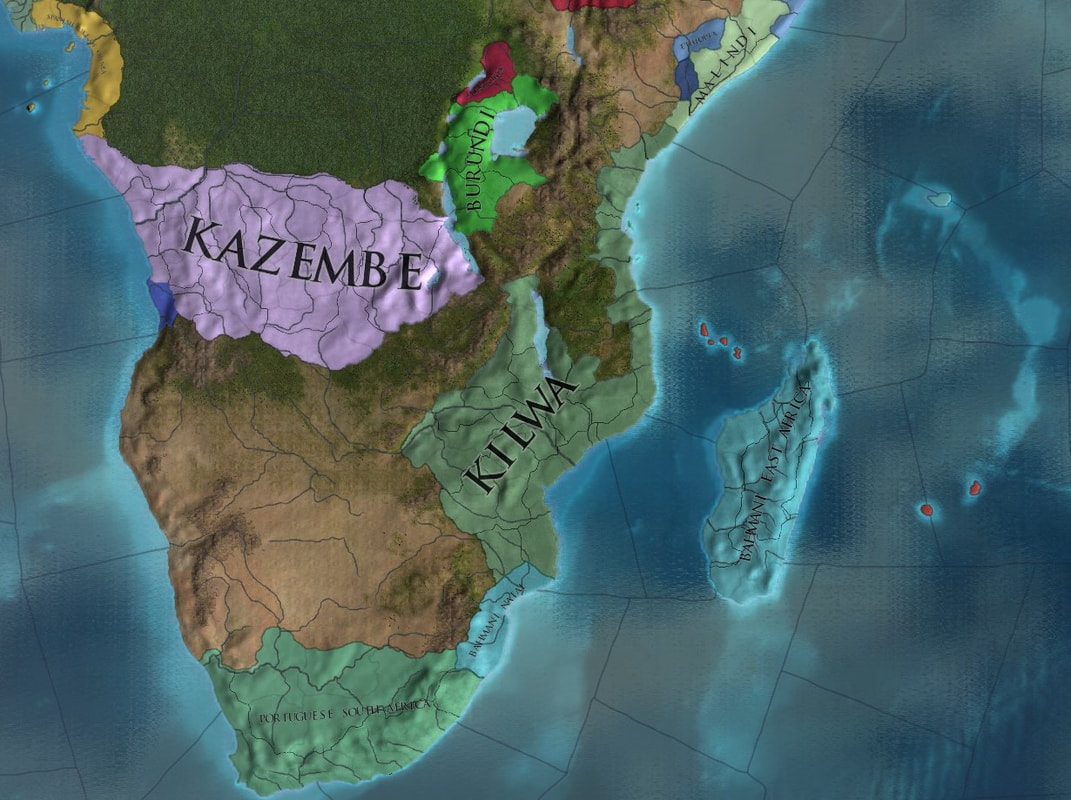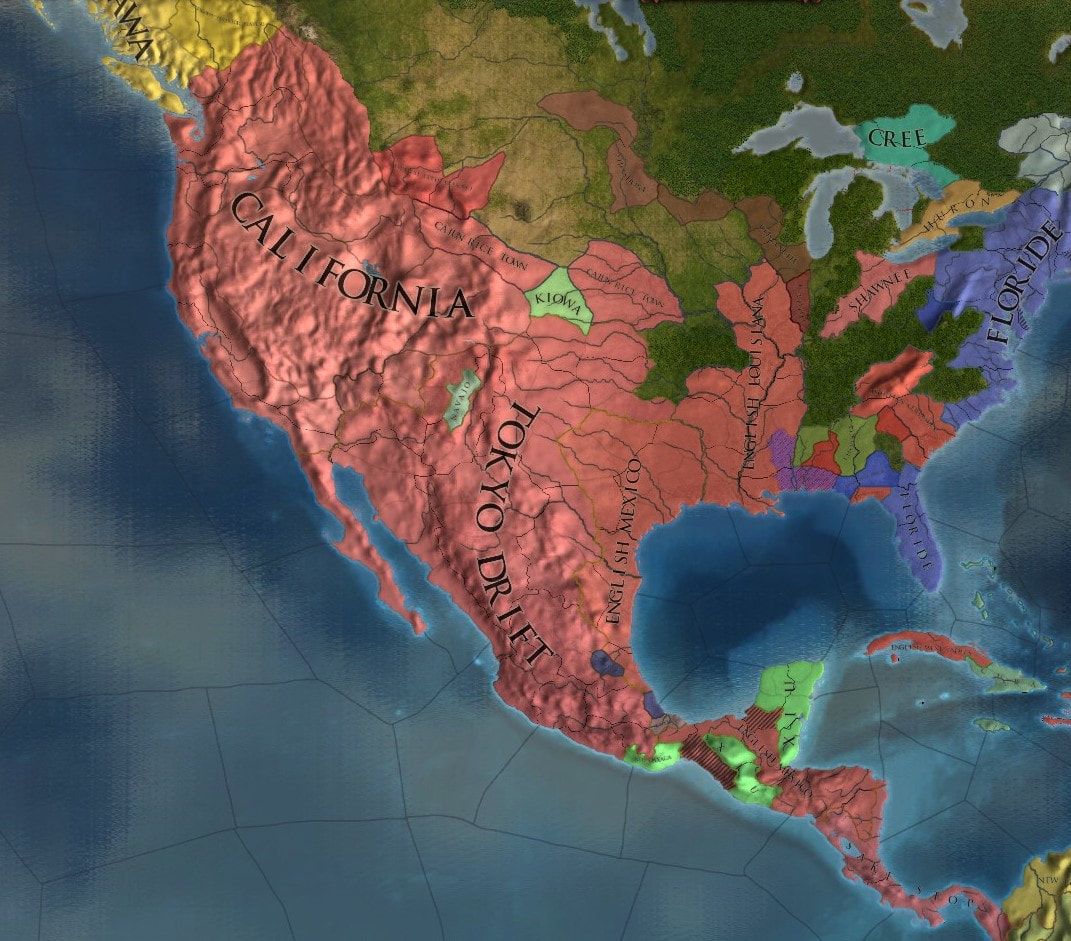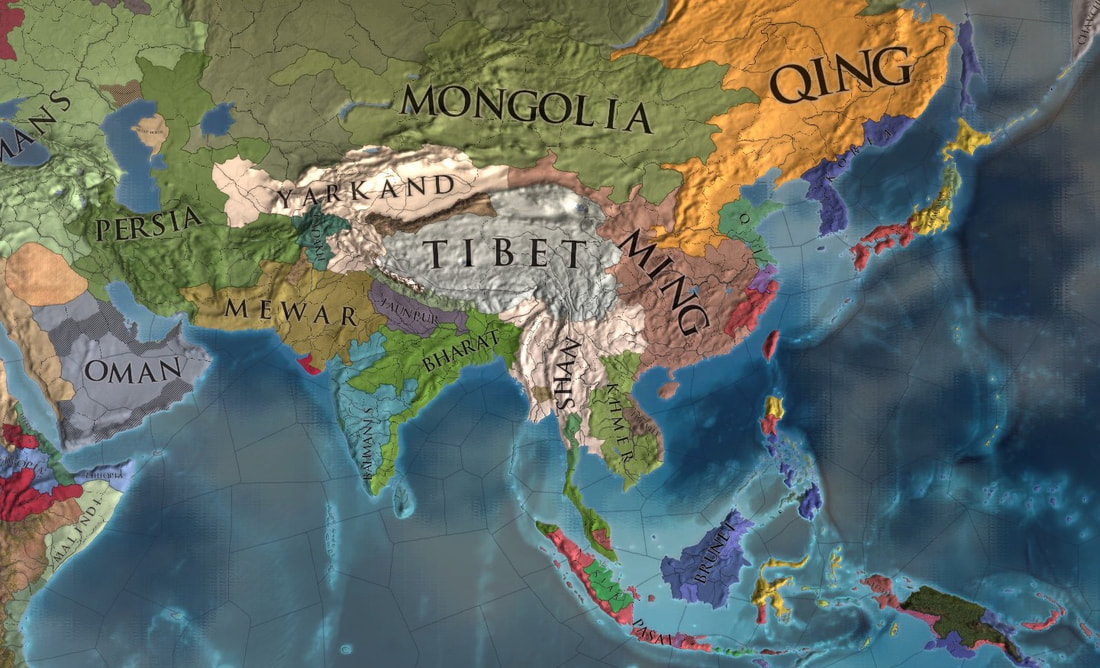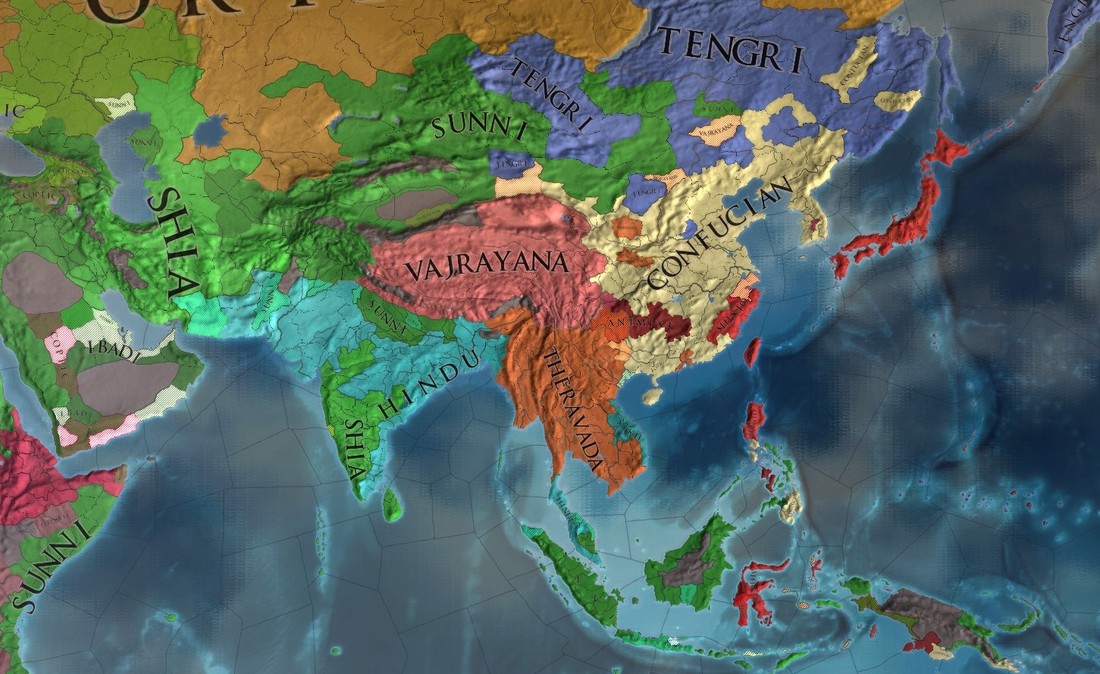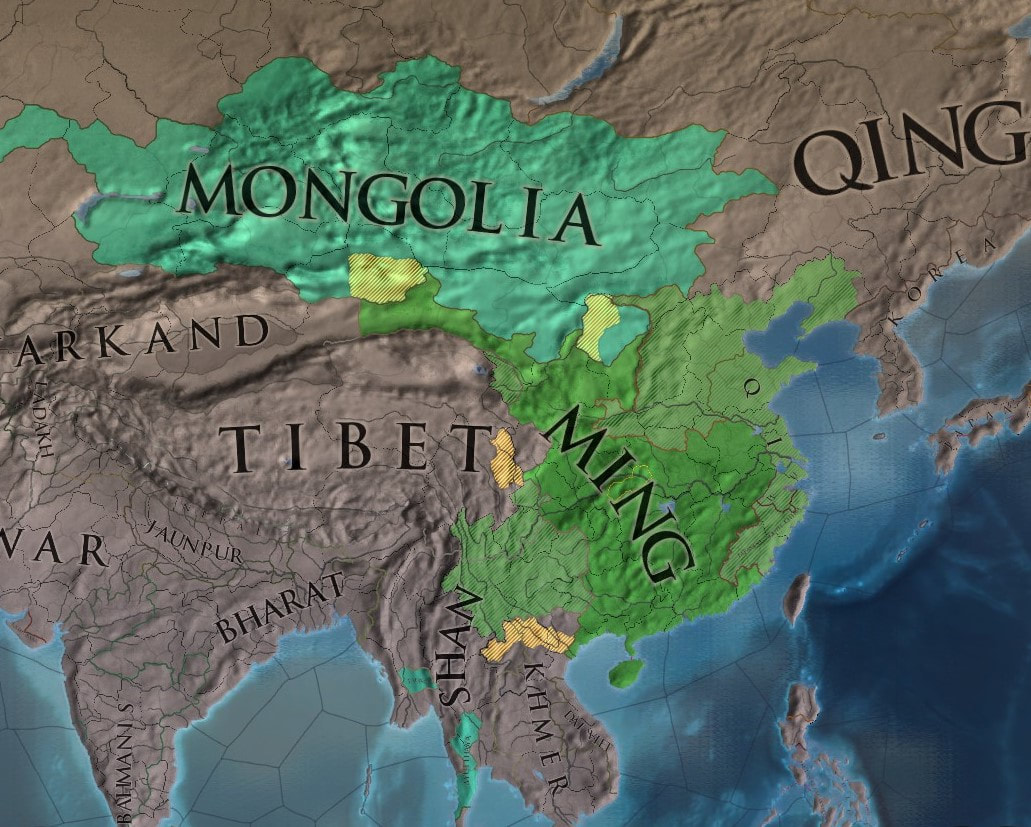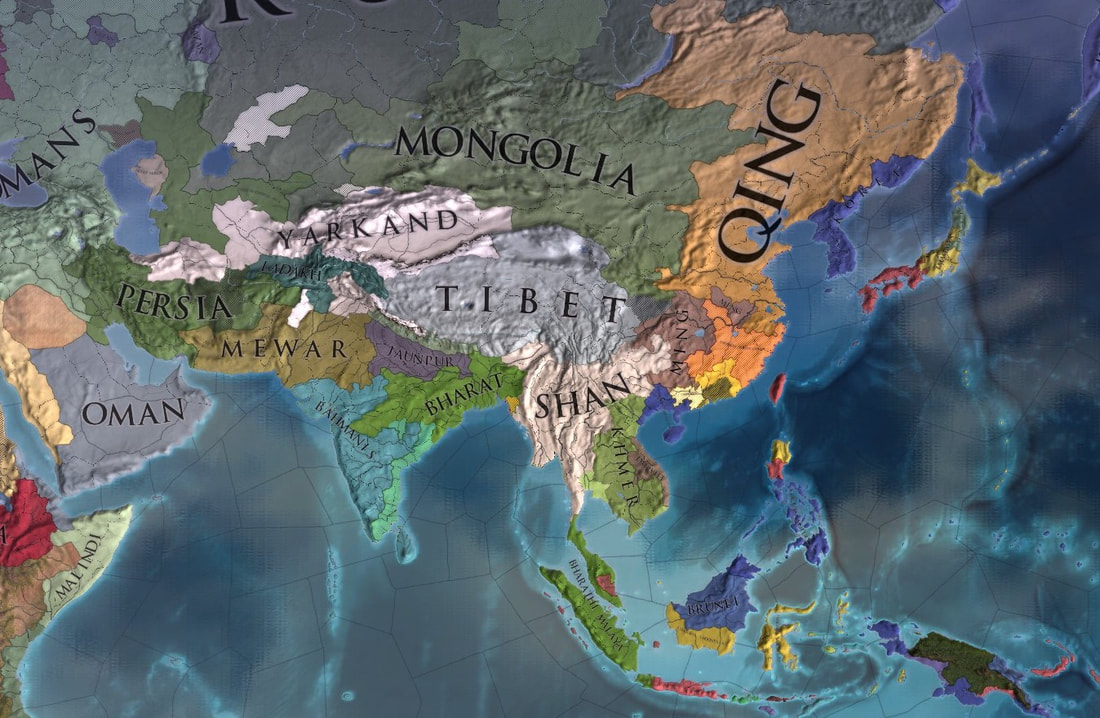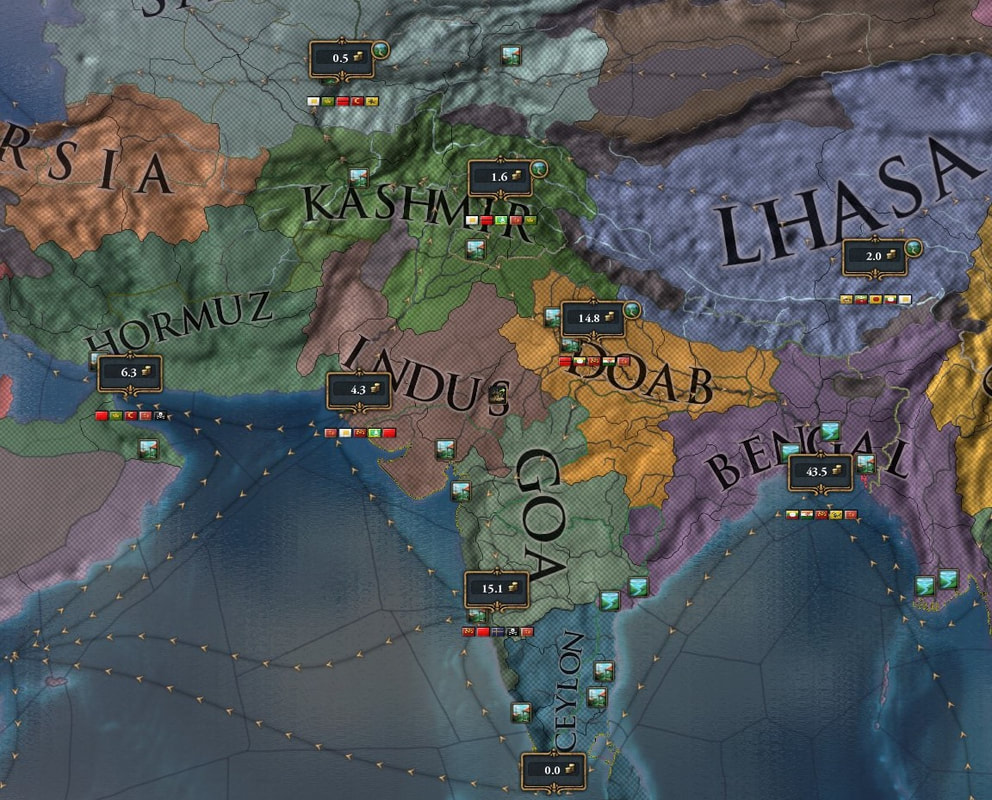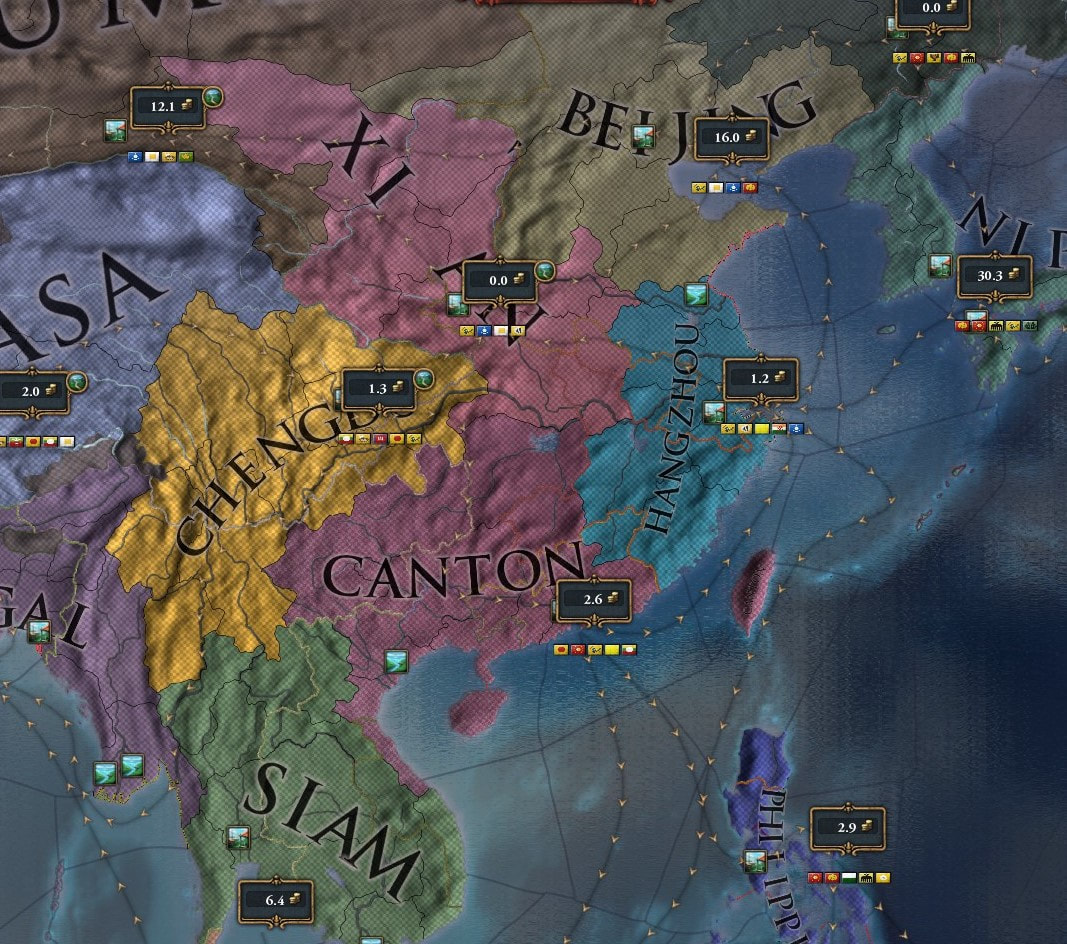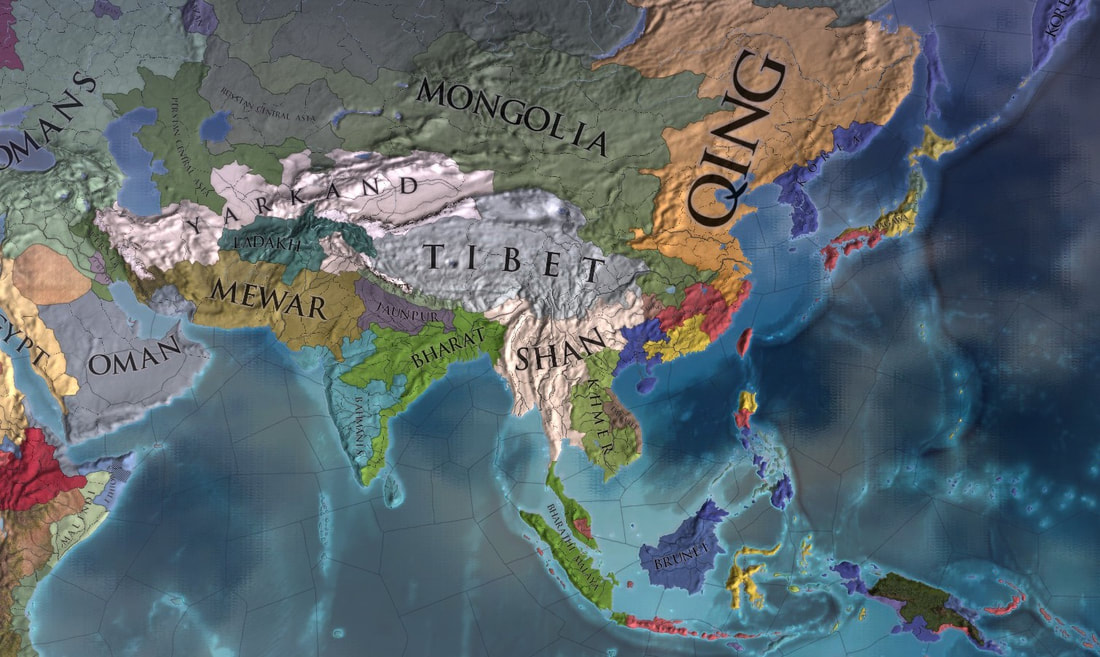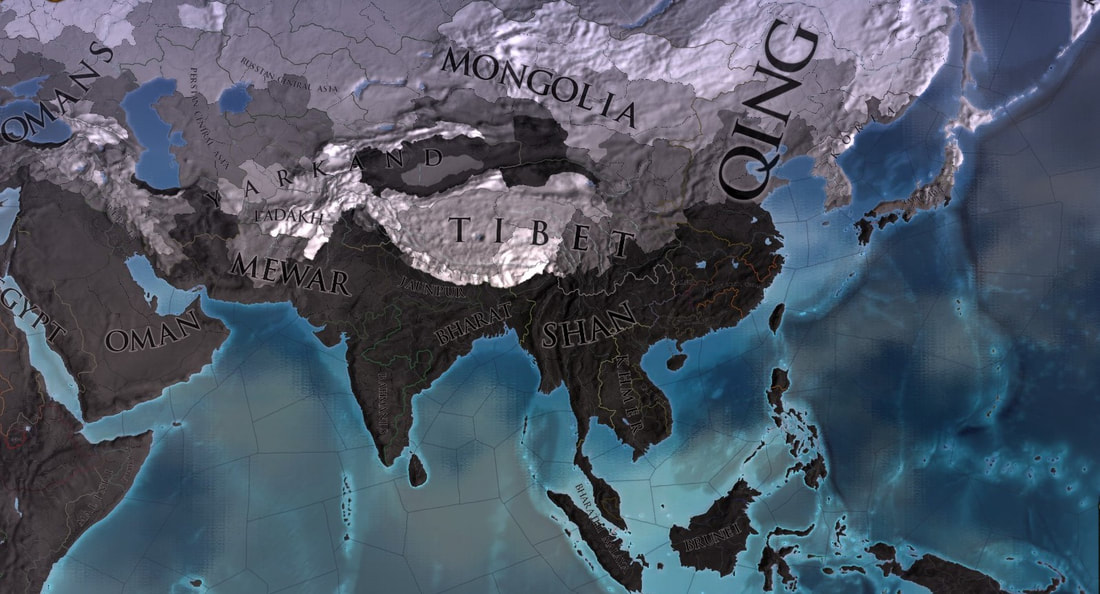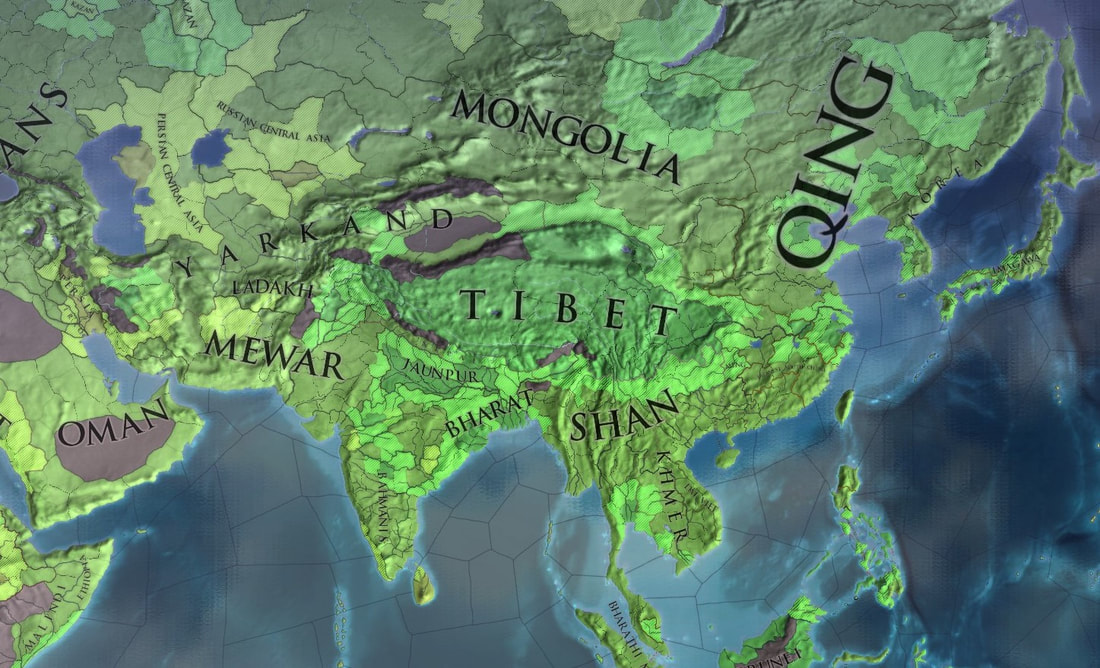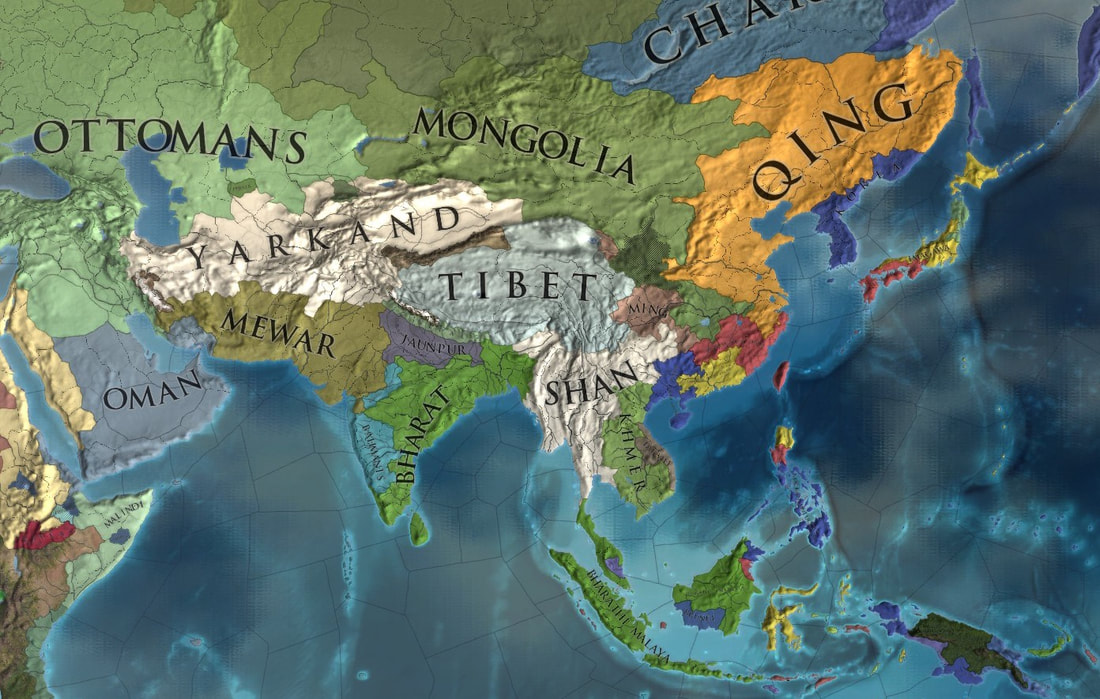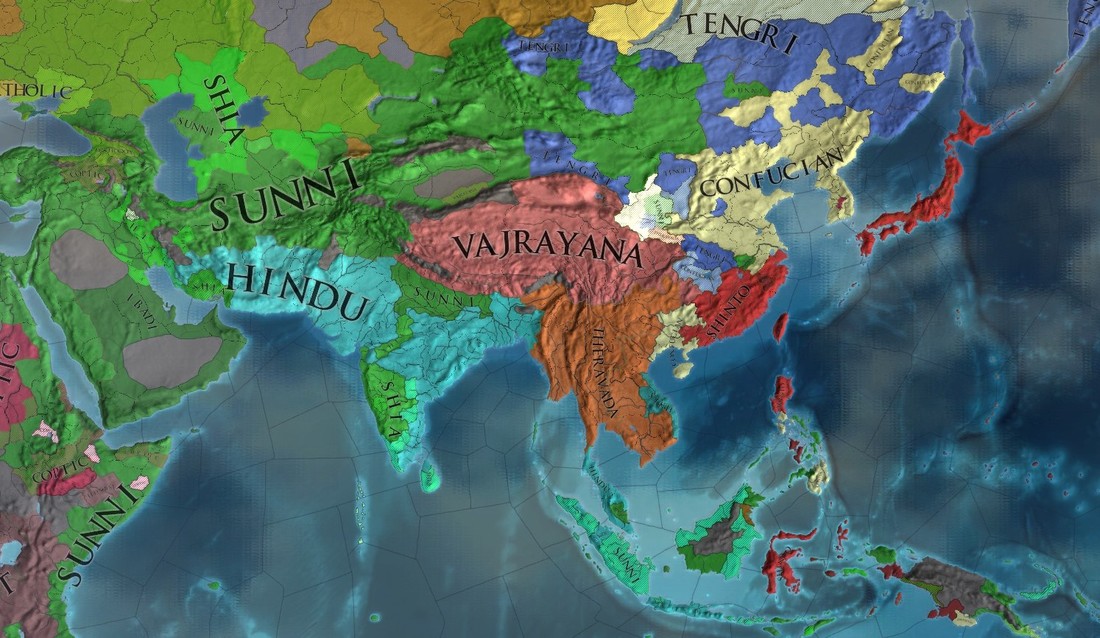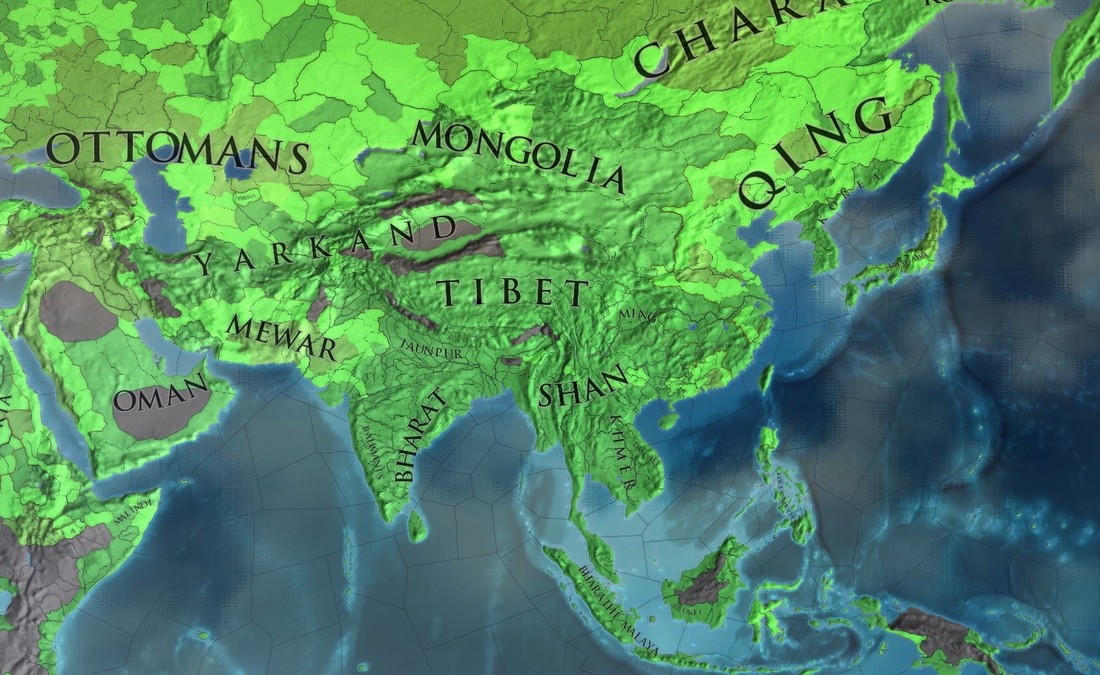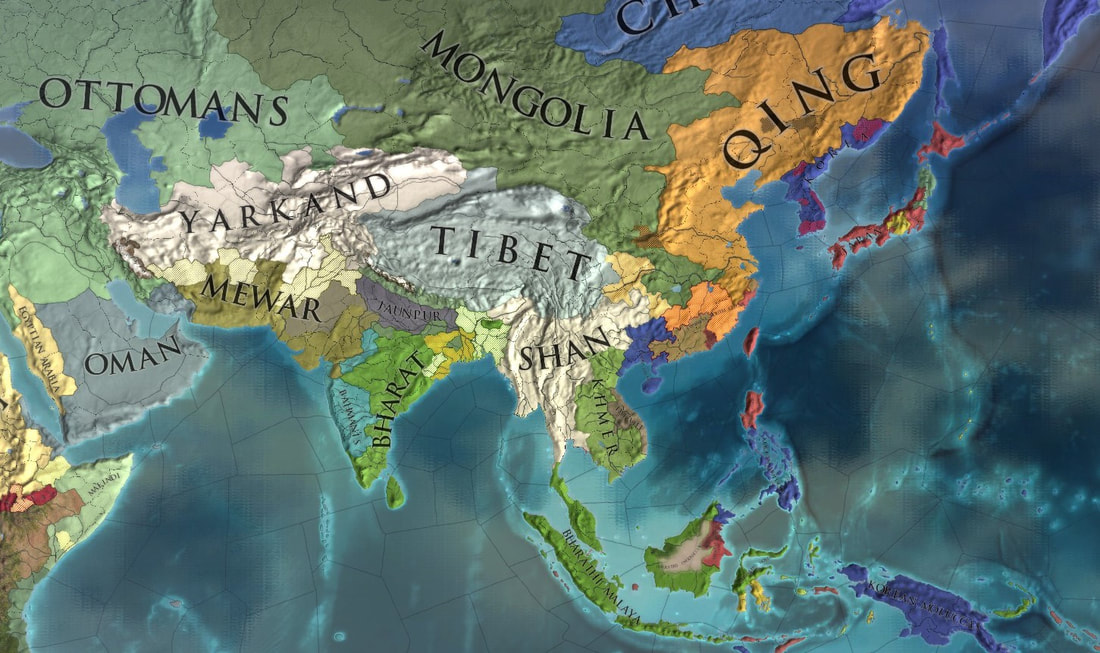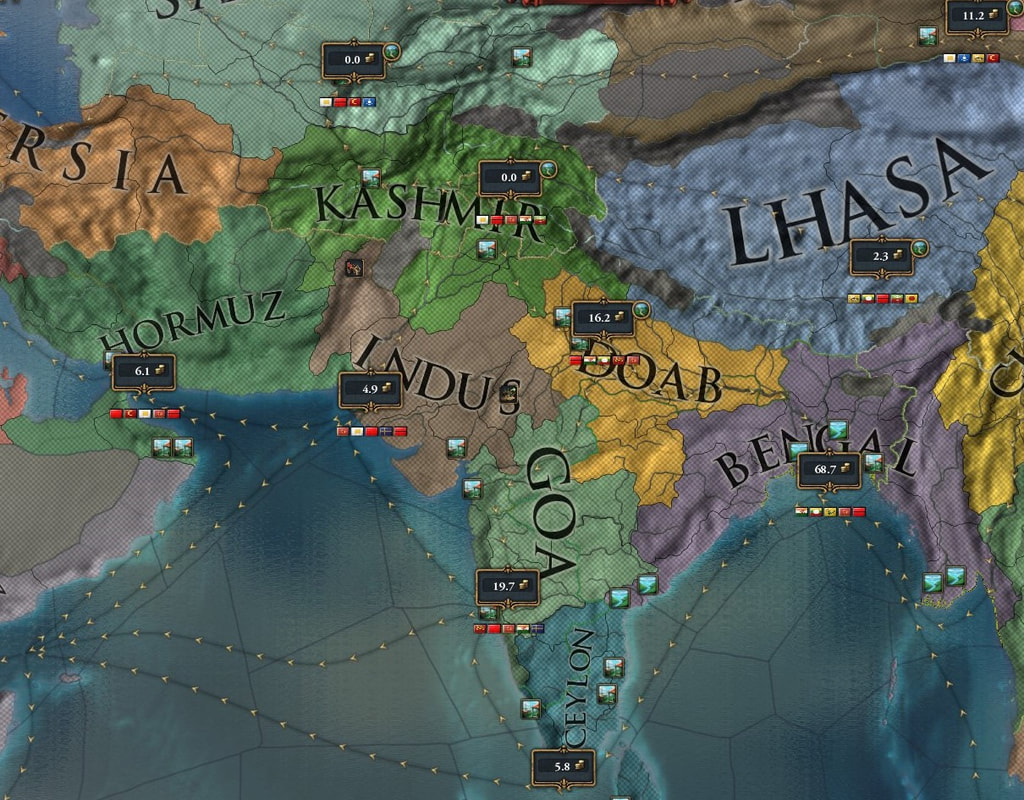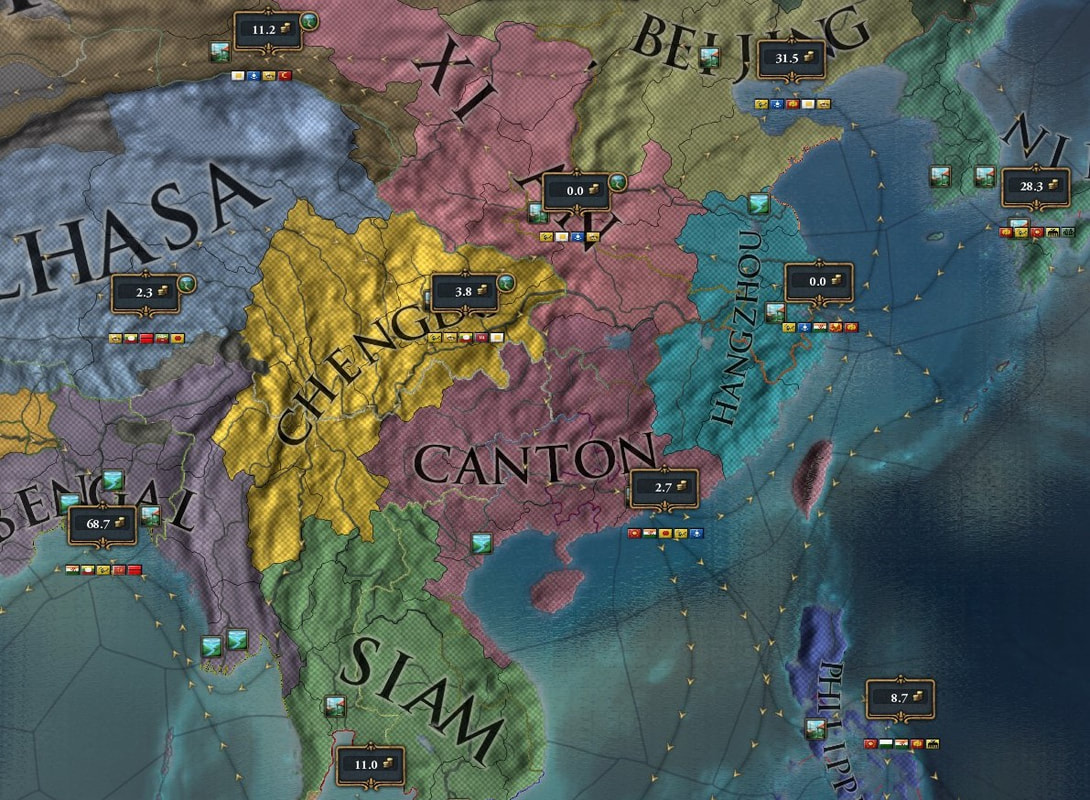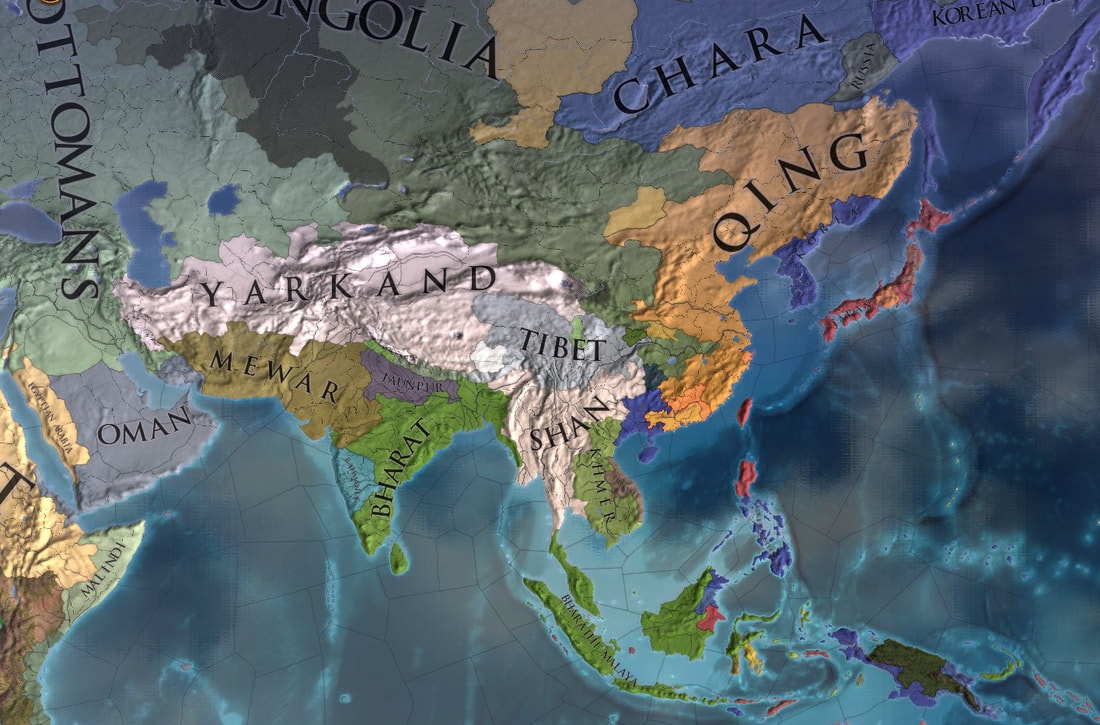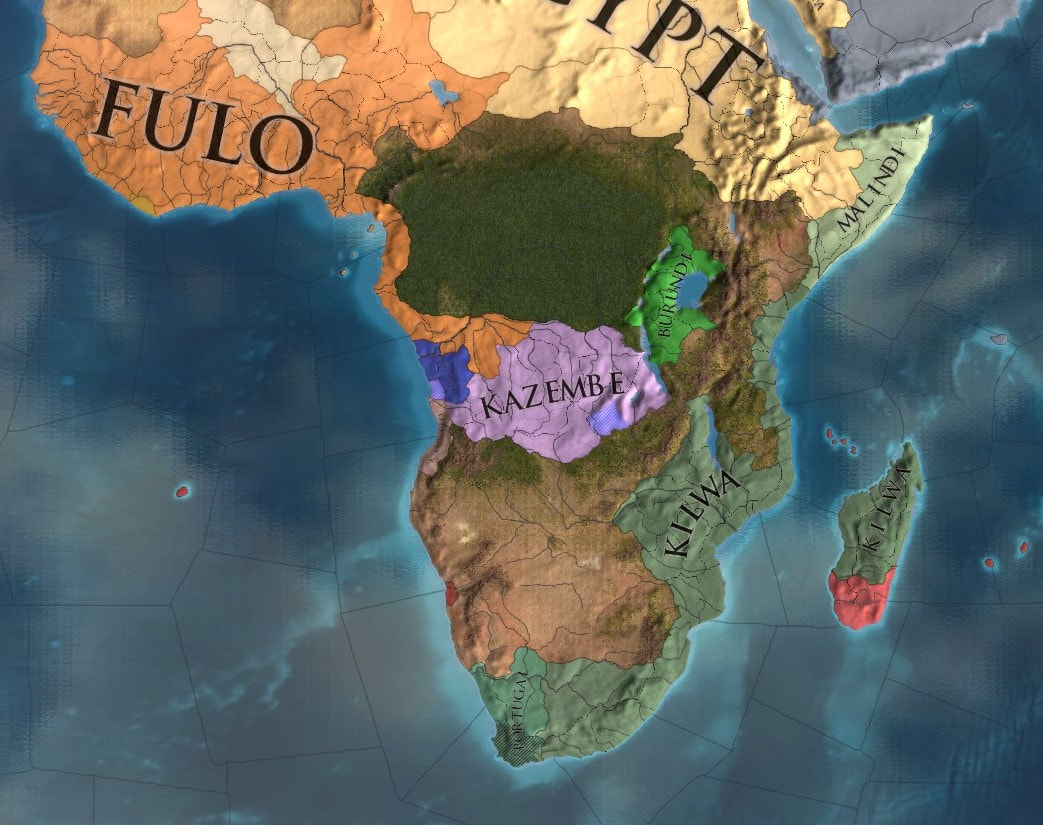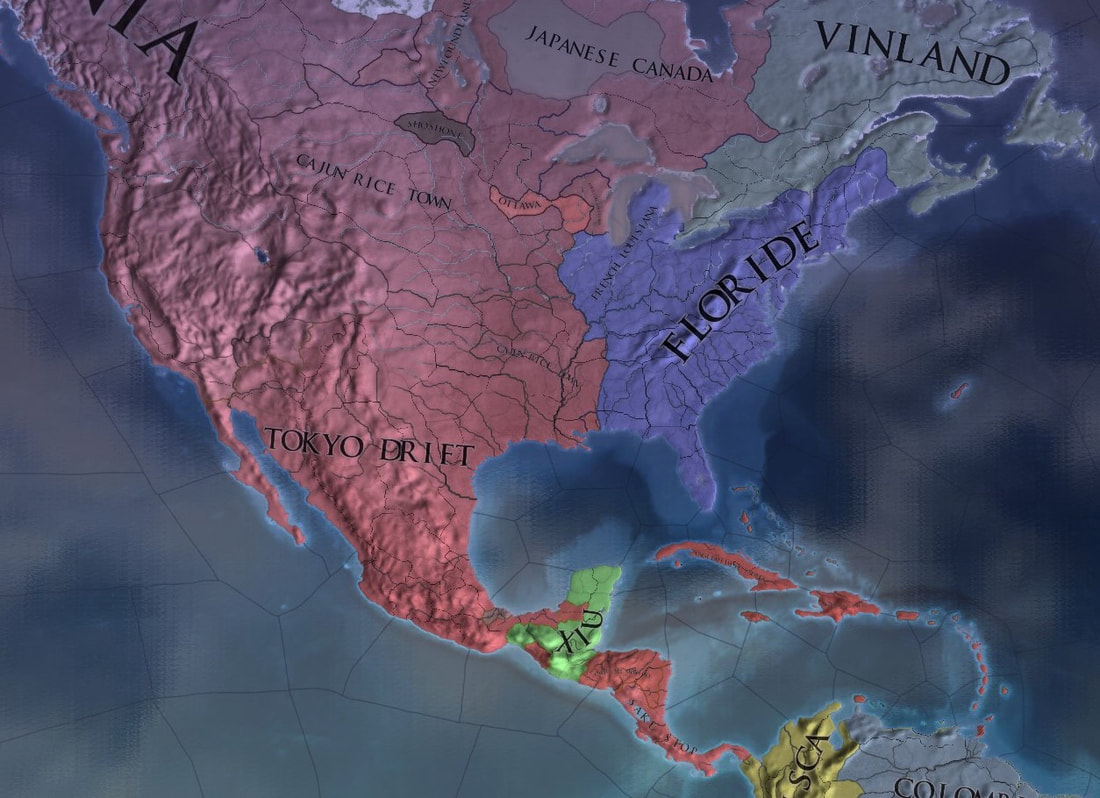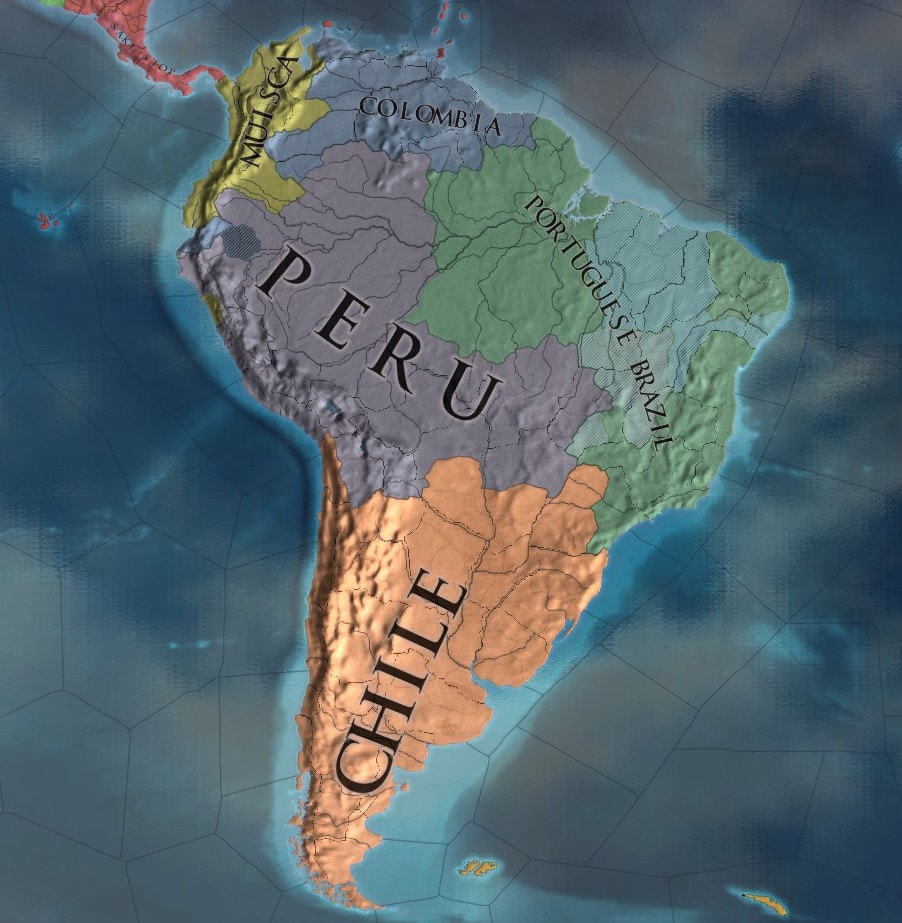Final Ranking - Prestige
|
The Daimyo
2 - Braxton - Empire of Japan - 21 12 - Noel - Daimyo of the Date - 15 16 - Weston - Grand Daimyo of the Imagawa - 14 17 - Eliminated - Daimyo of the Shimazu - X Top Tier The Tributary Kings
4 - Robby - Kingdom of Shan - 14 8 - Blake - Kingdom of Korea - 8 11- Chris - Kingdom of Khmer - 7 13 - Mike - Kingdom of Dai Viet - 6 3rd Tier |
The Khans and Kham
3 - Brian - Khaganate of the Qing - 18 5 - Quinton - Sultanate of Yarkand - 12 7 - Josh - Republic of Mongolia - 11 9 - Brad - Kingdom of Tibet - 10 2nd Tier The Rajas and Sultans
1 - Kassidy - Empire of Bharat - 10 6 - Micheal - Sultanate of Jaunpur - 4 10 - Alec - Sultanate of Oman - 3 14 - Zane - Kingdom of Mewar - 2 15 - Jake - Grand Republic of the Bahmanis - 1 4th Tier |
the Mandate of Heaven - Starting Conditions
This campaign will focus on the monolithic Chinese empire and its influence over East Asia. Participants will control major Asian nations of the era, all dwarfed by the vast realm of the Ming dynasty in the east and the great horde of the Timurids in the west. The Mandate of Heaven is held by the Ming dynasty, but any nation that chooses to follow an eastern religion may challenge the Ming for the Mandate, and deteriorating the reigning emperor's hold on the title relies upon defying his demands for tribute. In Japan, the feudal daimyos fight over control of the shogunate, but those who can consolidate power on the islands will be able to tap their strong military traditions to launch towards greater conquests. The rulers of India remain aloof from these particular struggles, but lacking these ancient power structures only ensures perpetual conflict and chaos in the realms south of the Himalayas.
House rules:
- Victory cards are active in order to encourage realistic "shifting alliances" and other Machiavellian backstabbery, and to penalize being inordinately friendly with those you share a border with. Victory cards will only appear for a player if they reach at least 300 total development. If the territory dictated by a card is captured it will reward the player with an immediate boost in points (1000, 2000, 3000, or 4000 points) and provide 1 additional point per month it is held. Inversely, if a player's victory card includes land formerly controlled by another player, the previous owner will receive a negative modifier equal to half the value of the victory card and will have 1 point deducted from their score per month that the victory card is held. Therefore every player's top priorities should be to ensure that no victory cards are taken from their own territory, followed by capturing as many victory cards as possible and denying all cards to other players. Victory cards that appear on protected areas will be randomly reassigned at the end of the session.
- Players may not annex, or directly cause the annexation of, any of the provinces owned by another player in the area of that player's capital, in any treaty they control, nor can they cause the release of a nation in any player's capital area in any treaty they control. Players may vassalize or otherwise subjugate a player, but may not diplomatically annex. A player's protected area will never change except when the capital is moved by a National Decision, and only if it would not cause an overlap with another player's capital area. Should a player change nations or fail to return to the game, the starting area of the player's abandoned nation will remain protected in this way and will never be available for annexation.
- During their first missed session, other players may not attack the absent player's nation, and may not demand any peace terms from their nation if they find themselves at war by other means. Absent players' nations are not protected in further missed sessions and players cannot take advantage of protection after the year 1750 regardless.
If a war continues into a player's protected session, his enemies may only demand the ceding/release of land they occupied at the start of the protected session, war reparations, gold, and/or humiliation.
- If a player is eliminated by the AI he may take over any unclaimed nation from the selection pool, any Daimyo that does not share a capital area with another player, Kyoto, or Musashi, any sub-Saharan African nation, eternal and glorious Leinster, or any nation in the New World excluding colonial nations.
- A player may use the vassal or colonial nation release mechanics to switch to playing a released subject. Similarly, a player may switch to playing one of their subject colonial nations or a vassal at the start of a session. This decision will likely change the player's capital area, and cannot be taken if it would cause any overlap with another player's capital area. This decision cannot be reversed.
Rewards:
- The top score from each bracket will receive a (likely alcohol-containing) prize.
- A player who changes nations will not remain in his bracket unless the new nation was one of the player's vassals or colonial nations. Changing to any other nation will place the player in the lowest prize bracket.
- Nation selection in a future campaign will go in order of final score ranking in this campaign, except those who received prizes will pick last (in order of final score).
House rules:
- Victory cards are active in order to encourage realistic "shifting alliances" and other Machiavellian backstabbery, and to penalize being inordinately friendly with those you share a border with. Victory cards will only appear for a player if they reach at least 300 total development. If the territory dictated by a card is captured it will reward the player with an immediate boost in points (1000, 2000, 3000, or 4000 points) and provide 1 additional point per month it is held. Inversely, if a player's victory card includes land formerly controlled by another player, the previous owner will receive a negative modifier equal to half the value of the victory card and will have 1 point deducted from their score per month that the victory card is held. Therefore every player's top priorities should be to ensure that no victory cards are taken from their own territory, followed by capturing as many victory cards as possible and denying all cards to other players. Victory cards that appear on protected areas will be randomly reassigned at the end of the session.
- Players may not annex, or directly cause the annexation of, any of the provinces owned by another player in the area of that player's capital, in any treaty they control, nor can they cause the release of a nation in any player's capital area in any treaty they control. Players may vassalize or otherwise subjugate a player, but may not diplomatically annex. A player's protected area will never change except when the capital is moved by a National Decision, and only if it would not cause an overlap with another player's capital area. Should a player change nations or fail to return to the game, the starting area of the player's abandoned nation will remain protected in this way and will never be available for annexation.
- During their first missed session, other players may not attack the absent player's nation, and may not demand any peace terms from their nation if they find themselves at war by other means. Absent players' nations are not protected in further missed sessions and players cannot take advantage of protection after the year 1750 regardless.
If a war continues into a player's protected session, his enemies may only demand the ceding/release of land they occupied at the start of the protected session, war reparations, gold, and/or humiliation.
- If a player is eliminated by the AI he may take over any unclaimed nation from the selection pool, any Daimyo that does not share a capital area with another player, Kyoto, or Musashi, any sub-Saharan African nation, eternal and glorious Leinster, or any nation in the New World excluding colonial nations.
- A player may use the vassal or colonial nation release mechanics to switch to playing a released subject. Similarly, a player may switch to playing one of their subject colonial nations or a vassal at the start of a session. This decision will likely change the player's capital area, and cannot be taken if it would cause any overlap with another player's capital area. This decision cannot be reversed.
Rewards:
- The top score from each bracket will receive a (likely alcohol-containing) prize.
- A player who changes nations will not remain in his bracket unless the new nation was one of the player's vassals or colonial nations. Changing to any other nation will place the player in the lowest prize bracket.
- Nation selection in a future campaign will go in order of final score ranking in this campaign, except those who received prizes will pick last (in order of final score).
The nations available are listed below, in order of most desirable starting conditions within each grouping. Brackets are divided into expected levels of competitiveness and experience. Newer players are suggested to choose lower brackets, as higher brackets will have more competitive and challenging starting positions as well as a more valuable prizes.
|
The Daimyo
Yamana - Braxton Imagawa - Weston Shimazu - Josh Date - Noel Top Bracket: Japanese Whisky |
The Khans and Kham
Haixi - Brian Yarkand - Quinton Mongolia - open (Josh) Kham - Brad 2nd Bracket: Better Japanese Sake |
The Tributary Kings
Korea - Blake Khmer - Chris Dai Viet - Mike Hsenwi - Robby 3rd Bracket: Japanese Sake |
The Rajas and Sultans
Jaunpur - Micheal Bahmanis - Jake Orissa - Kassidy Mewar - Zane Oman - Alec 4th Bracket: EU4 DLC Expansion |
The Tributary Kings - Ruling in the shadow of the Celestial Empire, these kings are obliged to pay tribute to the Emperor's authority or risk his wrath. Tributaries enjoy the protection of the Ming dynasty from those who do not pay homage to their Emperor and are also independent to pursue their own conflicts with other tributaries. These benefits often make tributary status more appealing than living in constant fear of the Ming armies. Should the Ming lose the Mandate of Heaven, however, these realms could aspire to rule over the rich lands of China.
The Kingdom of Korea - King Do Yi
- Starting development: 130
The Kingdom of Khmer - King Barom Reachea II Khmer
- Starting development: 85
The Kingdom of Dai Viet - King Bang Co Le
- Starting development: 79
The Kingdom of Hsenwi - King Sao Hsam Si-Li Kengtung
- Starting development: 40
The Kingdom of Korea - King Do Yi
- Starting development: 130
The Kingdom of Khmer - King Barom Reachea II Khmer
- Starting development: 85
The Kingdom of Dai Viet - King Bang Co Le
- Starting development: 79
The Kingdom of Hsenwi - King Sao Hsam Si-Li Kengtung
- Starting development: 40
The Khans and Kham - While the Ming claim authority over the steppe, the khans do not often submit and are an ever-present threat to Chinese authority. The Yuan dynasty, Mongol rulers of China, has only recently been defeated and overthrown by the Ming, and every Khan dreams of restoring Mongol rule over the Chinese river valleys. From the Roof of the World, the princes of Kham watch the conflicts develop below them and wait for the opportunity to extend their influence.
The Khanate of Haixi - Khan Singgen Darha Yehe Nara
- Starting development: 64
The Malikate of Yarkand - Malik Sayyid Ali Dughlat
- Starting development: 55
- Vassal of Chagatai Khanate
The Horde of Mongolia - Jinong Tayisung Borjigin
- Starting development: 49
- Vassal of the Oirat Khanate
The Princedom of Kham - Prince Sonam Sangpo Derge
- Starting development: 30
The Khanate of Haixi - Khan Singgen Darha Yehe Nara
- Starting development: 64
The Malikate of Yarkand - Malik Sayyid Ali Dughlat
- Starting development: 55
- Vassal of Chagatai Khanate
The Horde of Mongolia - Jinong Tayisung Borjigin
- Starting development: 49
- Vassal of the Oirat Khanate
The Princedom of Kham - Prince Sonam Sangpo Derge
- Starting development: 30
The Rajas and the Sultans - India is fractured and diverse, constantly in flux. Located between Europe and the Far East, with valuable resources easily within reach, the rulers in India have endless opportunities, and foreign powers see this as well. The Timurids are invading the subcontinent from the Northwest, intent on forming an empire to rival those of ancient conquerors, and explorers from far off Europe are beginning to arrive by sea. The Rajas and Sultans of India must fend of these threats as well as each other.
The Sultanate of Jaunpur - Sultan Mahmud Shah Sharqi
- Starting development: 165
- Vassals: Bagelkhand (5 development)
The Sultanate of the Bahmanis - Sultan Ala ud-Din Ahmad Shah II Bahmanid
- Starting development: 157
The Kingdom of Orissa - Maharaja Kapilendra Gajapati
- Starting development: 58
- Vassals: Garjat (12 development)
The Kingdom of Mewar - Maharana Kumbhakarna Singh
- Starting development: 44
- Vassals: Hadoti (9 development)
The Sultanate of Oman - Sultan Mahzum Nabhan
- Starting development: 36
The Sultanate of Jaunpur - Sultan Mahmud Shah Sharqi
- Starting development: 165
- Vassals: Bagelkhand (5 development)
The Sultanate of the Bahmanis - Sultan Ala ud-Din Ahmad Shah II Bahmanid
- Starting development: 157
The Kingdom of Orissa - Maharaja Kapilendra Gajapati
- Starting development: 58
- Vassals: Garjat (12 development)
The Kingdom of Mewar - Maharana Kumbhakarna Singh
- Starting development: 44
- Vassals: Hadoti (9 development)
The Sultanate of Oman - Sultan Mahzum Nabhan
- Starting development: 36
The Daimyo - (High Difficulty) The Japanese are ruled by an emperor, but temporal power is primarily invested in the clan that holds the shogunate. The Ashikaga have become complacent and overconfident in their control, and the many daimyo of the land grow bold, seizing land from weaker clans and consolidating power normally spread thin. Soon the Ashikaga will find Kyoto, and their claim on the shogunate, under siege. A shogun that can keep the daimyo in line through diplomacy or violence wields a mighty sword...one that could be used to offer the clans control over foreign land in exchange for their loyalty.
The Daimyo of the Yamana - Lord Mochitoyo Yamana
- Starting development: 29
The Daimyo of the Imagawa - Lord Noritada Imagawa
- Starting development: 11
The Daimyo of the Shimazu - Lord Tadakuni Shimazu
- Starting development: 9
The Daimyo of the Date - Lord Mochimune Date
- Starting development: 9
The Daimyo of the Yamana - Lord Mochitoyo Yamana
- Starting development: 29
The Daimyo of the Imagawa - Lord Noritada Imagawa
- Starting development: 11
The Daimyo of the Shimazu - Lord Tadakuni Shimazu
- Starting development: 9
The Daimyo of the Date - Lord Mochimune Date
- Starting development: 9
Session 1
|
Political - 1467
|
Session 2
|
Political - 1492
|
Session 3
|
Victory Points
Sultanate of the Bahmanis - 298 Empire of Japan - 135 Kingdom of Orissa - 18 Sultanate of Jaunpur - 15 Kingdom of Mewar - 7 Kingdom of Dai Viet - 3 Daimyo of the Imagawa - 0 Kingdom of Korea - 0 Kingdom of Khmer - 0 Daimyo of the Date - 0 Kingdom of Hsenwi - 0 Malikate of Yarkand - 0 Horde of Mongolia - 0 Kingdom of Tibet - 0 Sultanate of Oman - 0 Khanate of the Manchu - 0 |
Victory Cards
Andhra (Ori) Eastern Korea (Kor) Maharashtra (Bah) |
Political - 1519
Session 4
|
Victory Points
Sultanate of the Bahmanis - 773 Kingdom of Orissa - 486 Empire of Japan - 385 Sultanate of Jaunpur - 15 Kingdom of Korea - 14 Kingdom of Dai Viet - 12 Kingdom of Mewar - 7 Malikate of Yarkand - 4 Kingdom of Tibet - 3 Khanate of the Manchu - 1 Daimyo of the Imagawa - 0 Kingdom of Khmer - 0 Daimyo of the Date - 0 Kingdom of Shan - 0 Horde of Mongolia - 0 Sultanate of Oman - 0 |
Victory Cards
Andhra (Ori) Maharashtra (Bah) Eastern Korea (Kor) Ningguta (Man) Inner Mongolia (Mon, Min) |
Political - 1549
Session 5
|
Victory Points
Sultanate of the Bahmanis - 1180 Empire of Japan - 933 Kingdom of Orissa - 906 Kingdom of Dai Viet - 40 Kingdom of Korea - 28 Sultanate of Jaunpur - 15 Khanate of the Manchu - 12 Kingdom of Mewar - 7 Malikate of Yarkand - 6 Kingdom of Tibet - 3 Kingdom of Shan - 3 Daimyo of the Imagawa - 1 Kingdom of Khmer - 0 Daimyo of the Date - 0 Horde of Mongolia - 0 Sultanate of Oman - 0 |
Victory Cards
Central Doab (Mew, Jau), Andhra (Ori) Luzon (Kor, Ima), Eastern Korea (Kor) Telingana (Bah), Maharashtra (Bah) Southern Kyushu (Jap), Ningguta (Man) Ningguta (Kor), Inner Mongolia (Mon, Min) |
Political - 1577
Session 6
|
Victory Points
Empire of Japan - 1480 Sultanate of the Bahmanis - 1339 Empire of Bharat -;~/|\(>,,,,<)/|\~)^~ Kingdom of Mewar - 45 Kingdom of Dai Viet - 41 Kingdom of Korea - 37 Sultanate of Jaunpur - 15 Khanate of the Manchu - 14 Kingdom of Tibet - 8 Emirate of Yarkand - 6 Kingdom of Shan - 6 Daimyo of the Imagawa - 2 Kingdom of Khmer - 0 Daimyo of the Date - 0 Duchy of Mongolia - 0 Sultanate of Oman - 0 |
Victory Cards
Luzon (Ima), Eastern Korea (Kor) Central Doab (Mew, Jau), Andhra (Bha) Telingana (Bah), Maharashtra (Bah) Southern Kyushu (Jap), Ningguta (Man) N. Bengal (Bha), W. Bengal (Bha) Ningguta (Kor), Inner Mongolia (Mon, Min) |
Political - 1599
Session 7
|
Victory Points
Empire of Bharat - 3084 Empire of Japan - 2310 Sultanate of the Bahmanis - 734 Khaganate of the Qing - 188 Kingdom of Korea - 81 Kingdom of Mewar - 62 Kingdom of Dai Viet - 41 Sultanate of Jaunpur - 16 Kingdom of Tibet - 8 Emirate of Yarkand - 6 Kingdom of Shan - 6 Sultanate of Oman - 5 Daimyo of the Imagawa - 2 Kingdom of Khmer - 0 Daimyo of the Date - 0 Duchy of Mongolia - 0 |
Victory Cards
Telingana (Bah), Maharashtra (Bah) Luzon (Ima), Eastern Korea (Kor) Central Doab (Mew, Jau), Andhra (Bha) Ningguta (Kor), Inner Mongolia (Mon) Southern Kyushu (Jap), Ningguta (Man) N. Bengal (Bha), W. Bengal (Bha) C. Thailand (Ayu), Tsang (Tib) |
Political - 1623
Session 8
|
Victory Points
Empire of Bharat - 4548 Empire of Japan - 3306 Sultanate of the Bahmanis - 908 Khaganate of the Qing - 361 Kingdom of Mewar - 86 Kingdom of Korea - 82 Daimyo of the Imagawa - 43 Kingdom of Dai Viet - 41 Kingdom of Shan - 33 Sultanate of Jaunpur - 16 Sultanate of Oman - 14 Kingdom of Tibet - 8 Emirate of Yarkand - 6 Kingdom of Khmer - 1 Daimyo of the Date - 0 Duchy of Mongolia - 0 |
Victory Cards
Tsang (Tib), Telingana (Bah), Maharashtra (Bah) Hokuriku (Ima), Luzon (Ima), Eastern Korea (Kor) Cape of Good Hope (Por), C. Doab (Mew, Jau), Andhra (Bha) Zhejiang (Jap), Ningguta (Kor), Inner Mongolia (Mon) L. Doab (Jau, Bha), C. Doab (Jau), U. Doab (Jau) S. Jilin (Qin), Southern Kyushu (Jap), Ningguta (Man) San'indo (Jap), Luzon (Jap), Hokuriku (Jap) Yun-Gui Hinterland (Min), C. Thailand (Ayu), Tsang (Tib) U. Doab (Mew), N. Bengal (Bha), W. Bengal (Bha) Multan (Mew), Transoxiana, Sirhind (Mew) |
Political - 1654
Session 9
|
Victory Points
Empire of Bharat - 6103 Empire of Japan - 4167 Emirate of Yarkand - 2170 Khaganate of the Qing - 1158 Sultanate of the Bahmanis - 738 Kingdom of Shan - 356 Kingdom of Mewar - 239 Daimyo of the Imagawa - 131 Kingdom of Korea - 124 Sultanate of Oman - 54 Kingdom of Dai Viet - 41 Sultanate of Jaunpur - 19 Kingdom of Tibet - 14 Kingdom of Khmer - 1 Daimyo of the Date - 0 Duchy of Mongolia - 0 |
Victory Cards
Tsang (Tib), Telingana (Bah), Maharashtra (Bah) Hokuriku (Ima), Luzon (Ima), Eastern Korea (Kor) Multan (Mew), Transoxiana, Sirhind (Mew) Zhejiang (Jap), Ningguta (Kor), Inner Mongolia (Mon) Cape of Good Hope (Por), C. Doab (Mew, Jau), Andhra (Bha) Yun-Gui Hinterland, C. Thailand (Ayu), Tsang (Tib) L. Doab (Jau, Bha), C. Doab (Jau), U. Doab (Jau) San'indo (Jap), Luzon (Jap), Hokuriku (Jap) S. Jilin (Qin), Southern Kyushu (Jap), Ningguta (Man) U. Doab (Mew), N. Bengal (Bha), W. Bengal (Bha) Shanshan (Yar), Sirhind (Mew, Yar), Bihar (Bha, Jau) |
Political - 1679
Session 10
|
Victory Points
Empire of Bharat - 7986 Empire of Japan - 5863 Kingdom of Shan - 4232 Sultanate of Jaunpur - 3128 Emirate of Yarkand - 2593 Khaganate of the Qing - 2522 Sultanate of the Bahmanis - 610 Kingdom of Korea - 488 Daimyo of the Imagawa - 311 Sultanate of Oman - 54 Kingdom of Dai Viet - 41 Kingdom of Tibet - 14 Kingdom of Khmer - 2 Duchy of Mongolia - 0 Daimyo of the Date - 0 Kingdom of Mewar - 0 |
Victory Cards
Rakhine (Sha), Telingana (Bah), Maharashtra (Bah) Hokuriku (Ima), Luzon (Ima), Eastern Korea (Kor) Yun-Gui Hinterland, C. Thailand, East Bengal (Bha) U. Doab (Mew), N. Bengal (Bha), W. Bengal (Bha) Multan (Mew), Transoxiana, Sirhind (Mew) Zhejiang (Jap), Ningguta (Kor), Inner Mongolia (Mon) Cape of Good Hope (Por), C. Doab (Mew, Jau), Andhra (Bha) S. Jilin (Qin), Southern Kyushu (Jap), Ningguta (Man) San'indo (Jap), Luzon (Jap), Hokuriku (Jap) Shanshan (Yar), Sirhind (Mew, Yar), Bihar (Bha, Jau) L. Doab (Jau, Bha), C. Doab (Jau), U. Doab (Jau) |
Political -1709
Session 11
|
Victory Points
Empire of Bharat - 9324 Kingdom of Shan - 5449 Empire of Japan - 5031 Sultanate of Jaunpur - 3345 Khaganate of the Qing - 3292 Emirate of Yarkand - 2815 Daimyo of the Imagawa - 1989 Kingdom of Korea - 1467 Duchy of Mongolia - 933 Sultanate of the Bahmanis - 321 Sultanate of Oman - 54 Kingdom of Dai Viet - 41 Kingdom of Tibet - 14 Kingdom of Khmer - 2 Daimyo of the Date - 0 Kingdom of Mewar - 0 |
Victory Cards
Rakhine (Sha), Telingana (Bah), Maharashtra (Bah) Yun-Gui Hinterland, C. Thailand, East Bengal (Bha) Hokuriku (Ima), Luzon (Ima), Eastern Korea (Kor) U. Doab (Mew), N. Bengal (Bha), W. Bengal (Bha) Zhejiang (Jap), Ningguta (Kor), Inner Mongolia (Mon) Multan (Mew), Transoxiana, Sirhind (Mew) San'indo (Jap), Luzon (Jap), Hokuriku (Jap) S. Jilin (Qin), Southern Kyushu (Jap), Ningguta (Man) Hubei (Jap), W. Gansu (Tib), Shanshan (Yar) Cape of Good Hope (Por), C. Doab (Mew, Jau), Andhra (Bha) Shanshan (Yar), Sirhind (Mew, Yar), Bihar (Bha, Jau) N. Tenasserim (Sha), C. Thailand (Sha), N. Thailand (Sha) L. Doab (Jau, Bha), C. Doab (Jau), U. Doab (Jau) |
Political - 1727
Session 12
1727-1759
|
Victory Points
Empire of Bharat - 14482 Kingdom of Shan - 7548 Khaganate of the Qing - 5348 Grand Daimyo of the Imagawa - 4668 Empire of Japan - 3812 Sultanate of Jaunpur - 3746 Sultanate of Yarkand - 3625 Duchy of Mongolia - 3359 Kingdom of Korea - 1662 Sultanate of Oman - 54 Kingdom of Dai Viet - 41 Kingdom of Tibet - 36 Kingdom of Khmer - 2 Daimyo of the Date - 0 Kingdom of Mewar - 0 Sultanate of the Bahmanis - 0 |
Victory Cards
C. Doab (Jau), Rakhine (Sha), Telingana (Bah), Maharashtra (Bah) C. Tenasserim (Bha), Yun-Gui Hinterland, C. Thailand, East Bengal (Bha) Pyongan (Kor), Zhejiang (Jap), Ningguta (Kor), Inner Mongolia (Mon) Guangxi (Kor), San'indo (Jap), Luzon (Jap), Hokuriku (Jap) Zhejiang (Qin), Hokuriku (Ima), Luzon (Ima), Eastern Korea (Kor) Bihar (Bha), U. Doab (Mew), N. Bengal (Bha), W. Bengal (Bha) Astrakhan (Ott), Multan (Mew), Transoxiana, Sirhind (Mew) Jiangxi (Jap, Ima), Hubei (Jap), W. Gansu (Tib), Shanshan (Yar) Shandong (Qin), S. Jilin (Qin), Southern Kyushu (Jap), Ningguta (Man) Assam (Sha, Bha), Shanshan (Yar), Sirhind (Mew, Yar), Bihar (Bha, Jau) W. Guangdong (Kor, Ima), N. Tenasserim (Sha), C. Thailand (Sha), N. Thailand (Sha) Lahore (Yar), L. Doab (Jau, Bha), C. Doab (Jau), U. Doab (Jau) Tapti (Mew), Cape of Good Hope (Por), C. Doab (Mew, Jau), Andhra (Bha) |
Political - 1759
Session 13
1759-1790
|
Victory Points
Empire of Bharat - 18771 Empire of Japan - 13695 Kingdom of Shan - 9334 Khaganate of the Qing - 7848 Sultanate of Jaunpur - 4236 Republic of Mongolia - 3557 Holy State of Tibet - 3107 Sultanate of Yarkand - 1969 Kingdom of Korea - 622 Sultanate of Oman - 54 Kingdom of Khmer - 2 Kingdom of Mewar - 0 Sultanate of the Bahmanis - 0 Grand Daimyo of the Imagawa - 0 Daimyo of the Date - 0 Kingdom of Dai Viet - 0 |
Victory Cards
C. Doab (Jau), Rakhine (Sha), Telingana (Bah), Maharashtra (Bah) Zhejiang (Qin), Hokuriku (Ima), Luzon (Ima, Kor), Eastern Korea (Kor) C. Tenasserim (Bha), Yun-Gui Hinterland, C. Thailand, East Bengal (Bha) Pyongan (Kor), Zhejiang (Jap), Ningguta (Kor), Inner Mongolia (Mon) Bihar (Bha), U. Doab (Mew), N. Bengal (Bha), W. Bengal (Bha) Jiangxi (Jap, Ima), Hubei (Jap), W. Gansu (Tib), Shanshan (Tib) Assam (Sha, Bha), Shanshan (Yar), Sirhind (Mew, Yar), Bihar (Bha, Jau) Astrakhan (Ott), Multan (Mew), Transoxiana, Sirhind (Mew) Shandong (Qin), S. Jilin (Qin), Southern Kyushu (Jap), Ningguta (Man) W. Guangdong (Kor, Ima), N. Tenasserim (Sha), C. Thailand (Sha), N. Thailand (Sha) Lahore (Yar), L. Doab (Jau, Bha), C. Doab (Jau), U. Doab (Jau) Tapti (Mew), Cape of Good Hope (Por), C. Doab (Mew, Jau), Andhra (Bha) Guangxi (Kor), San'indo (Jap), Luzon (Jap), Hokuriku (Jap) |
Political - 1790
Session 14
1790-1821
|
Victory Points
Empire of Bharat - 25932 Empire of Japan - 17074 Khaganate of the Qing - 11736 Kingdom of Shan - 9027 Sultanate of Yarkand - 5713 Sultanate of Jaunpur - 4584 Republic of Mongolia - 3487 Kingdom of Korea - 553 Kingdom of Tibet - 345 Sultanate of Oman - 54 Kingdom of Khmer - 2 Daimyo of the Date - 0 Kingdom of Dai Viet - -1488 Kingdom of Mewar - -1999 Grand Republic of the Bahmanis - -3456 Grand Daimyo of the Imagawa - -3721 |
Victory Cards
C. Doab (Jau), Rakhine (Sha), Telingana (Bah), Maharashtra (Bah) Zhejiang (Qin), Hokuriku (Ima), Luzon (Ima, Kor), Eastern Korea (Kor) Pyongan (Kor), Zhejiang (Jap), Ningguta (Kor), Inner Mongolia (Mon) C. Tenasserim (Bha), Yun-Gui Hinterland, C. Thailand, East Bengal (Bha) Astrakhan (Ott), Multan (Mew), Transoxiana, Sirhind (Mew) Bihar (Bha), U. Doab (Mew), N. Bengal (Bha), W. Bengal (Bha) Jiangxi (Jap, Ima), Hubei (Jap), W. Gansu (Tib), Shanshan (Tib) Shandong (Qin), S. Jilin (Qin), Southern Kyushu (Jap), Ningguta (Man) Assam (Sha, Bha), Shanshan (Yar), Sirhind (Mew, Yar), Bihar (Bha, Jau) W. Guangdong (Kor, Ima), N. Tenasserim (Sha), C. Thailand (Sha), N. Thailand (Sha) Lahore (Yar), L. Doab (Jau, Bha), C. Doab (Jau), U. Doab (Jau) Tapti (Mew), Cape of Good Hope (Por), C. Doab (Mew, Jau), Andhra (Bha) Guangxi (Kor), San'indo (Jap), Luzon (Jap), Hokuriku (Jap) |
Political - 1821

